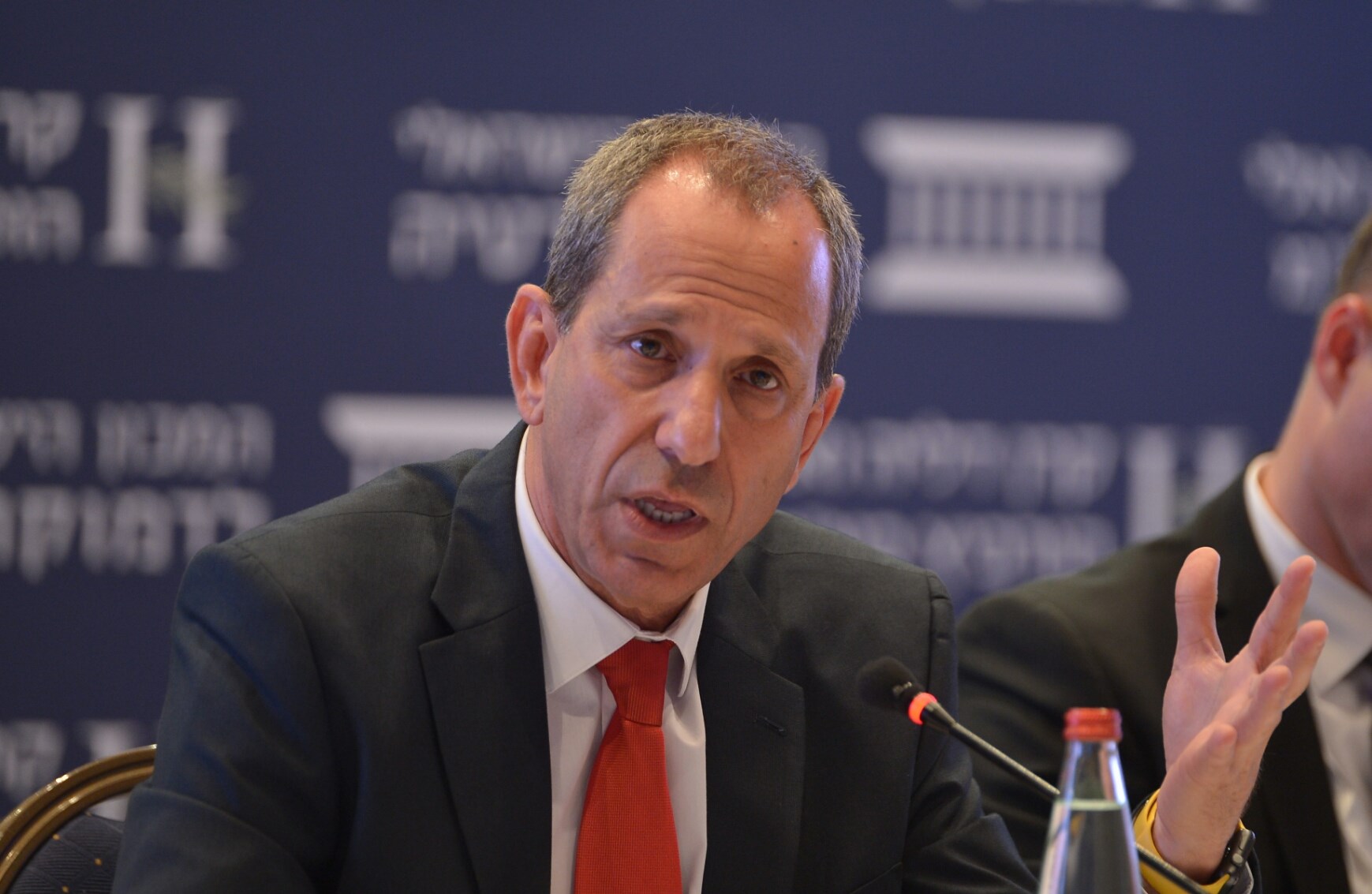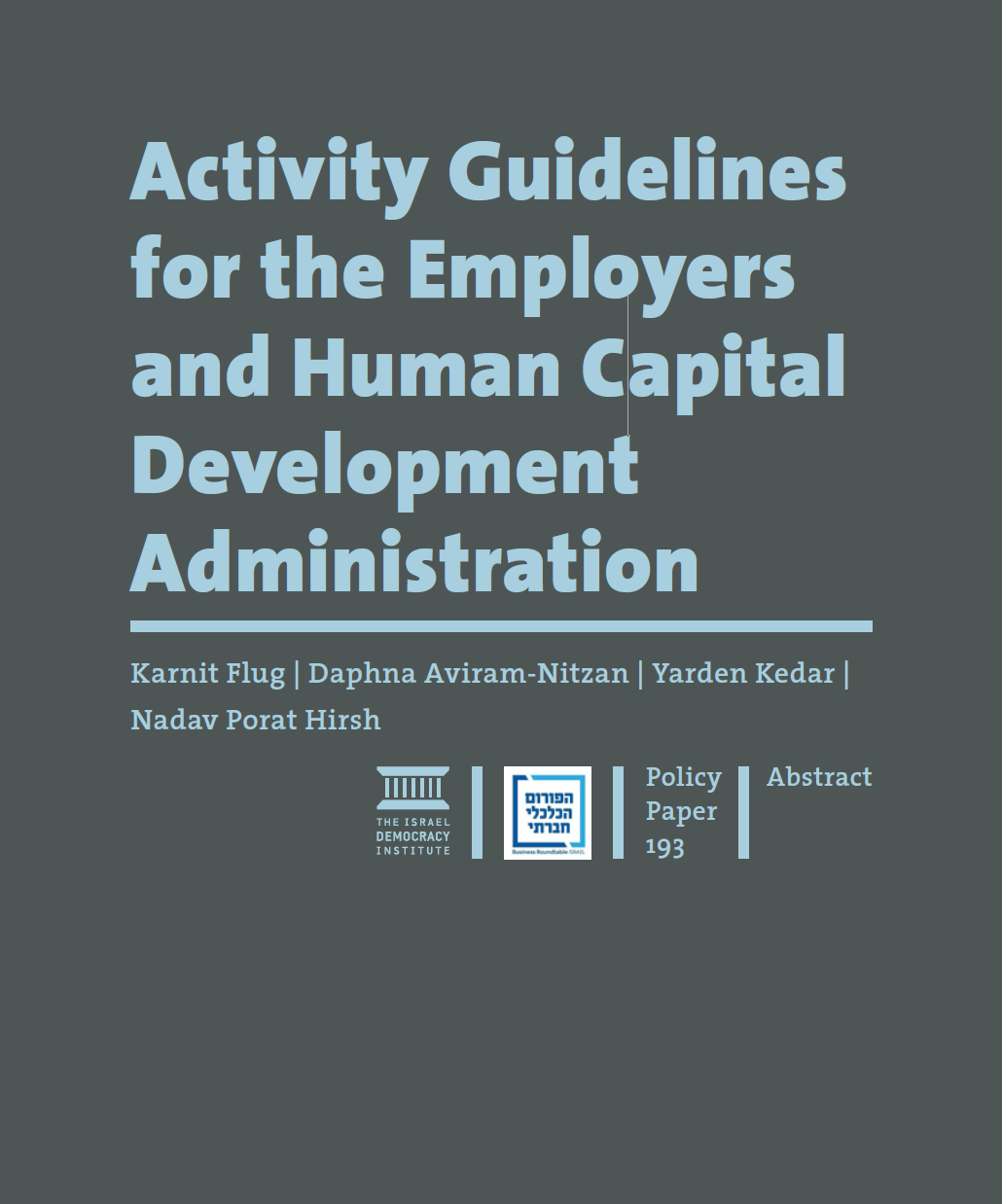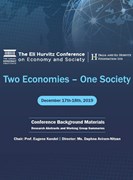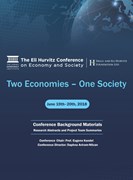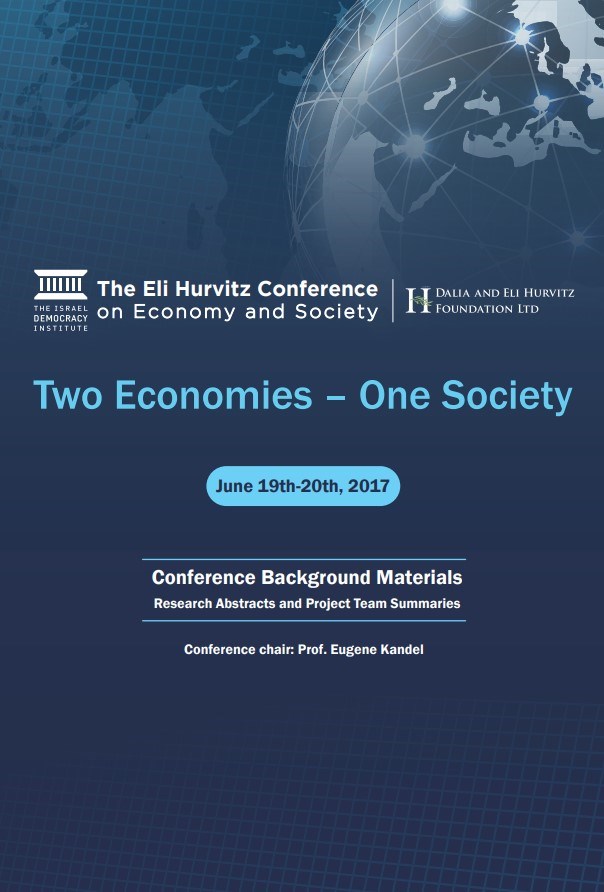

Publications Regarding Economy and Governance
Articles

Quantity and Cost of Reserve Service in the Event that Haredim Enter Regular and Reserve Service in the IDF
Written By: Adv. Shlomit Ravitsky Tur-Paz, Gabriel Gordon
We examine the increased burden of reserve service that the defense establishment is seeking to impose on the population groups that already perform regular and reserve service, and the economic-budgetary implications of this step for the period through to 2050.

JFNA & IDI Webinar on Israel’s Economy with Prof. Karnit Flug and Bloomberg News’ Galit Altstein
Written By: Prof. Karnit Flug,
IDI's Prof. Karnit Flug, VP of Research and the William Davidson Senior Fellow for Economic Policy joined Jeff Schoenfeld, Chair of the Jewish Federation's Israel and Overseas Committee and Bloomberg's Galit Altstein to discuss the implications of the ongoing war in Gaza on Israel's economy.
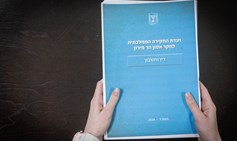
What the Mount Meron Disaster Commission of Inquiry Teaches us about a Future Commission of Inquiry on the October 7 Massacre
Written By: Dr. Dana Blander
Israel's Commission of Inquiry into the Mount Meron disaster released a report that criticizes shortcomings in the culture of accountability in Israel. The Committee distinguished between personal responsibility and ministerial responsibility and offered important recommendations, including for police operations during mass events.

Explainer: The Supreme Court hearing on (non) recruitment of ultra-Orthodox men and budgeting of yeshivas
Written By: Adv. Shlomit Ravitsky Tur-Paz
What is the connection between the expiration of the conscription law and the budgets for yeshivas? What exactly was discussed in the Supreme Court and is the state in violation of the law? Bottom line, will the ultra-Orthodox be recruited, or not?

On Moody's Credit Downgrade: Economic Policy Change Cannot Wait.
Written By: Prof. Karnit Flug
Over the weekend, Moody’s Investors Service announced that it had downgraded Israel’s credit rating from A1 to A2 and assigned it a “negative” credit outlook. Our policymakers would be well advised to study the risk analysis and assessment in Moody’s report closely and to take all possible steps to mitigate the risks.

A More Targeted Approach to IDF Reservist Compensation
Written By: Dr. Carmit Padan
Israeli reserve soldiers are making unimaginable sacrifices to protect their country. To rise to the challenge of meeting the IDF's expanded personnel needs, Israel's policy solutions must be as diverse as are the reservists serving this nation. A "one-size-fits-all" compensation approach will not cut it.
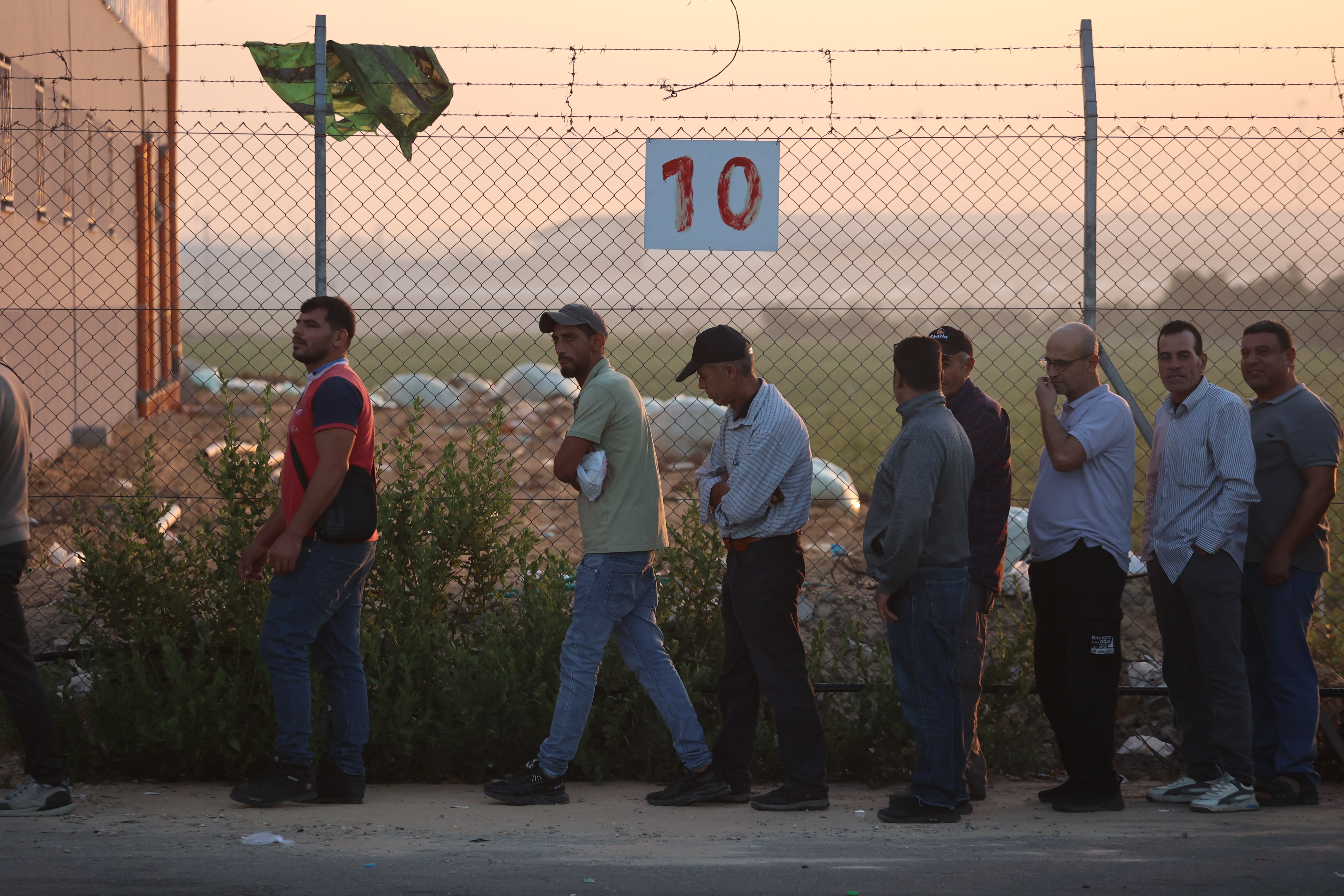
On Palestinian Workers: The Right Answer isn't Always the Easy One
Written By: Prof. Yotam Margalit
A decision to allow Palestinian workers back into Israel is not at all a simple matter. Despite recommendations by Israel's security agencies to allow entry to Palestinian workers, the Ministers of Construction and of the Economy oppose it for security reasons. As alternative solutions to the severe shortage of workers are unsatisfactory, we must ask ourselves whether we, as a country, are prepared to withstand another socioeconomic crisis.

Israeli Public Is Concerned Over Budget Priorities as the War Continues
Written By: Daphna Aviram-Nitzan, Prof. Karnit Flug, Roe Kenneth Portal
This survey was conducted in order to assess public opinion regarding the preferred economic policy in light of the war in Gaza, to identify the main areas of concern to the public, and to examine the public’s views on various social issues.

Coalition and Political Funds: Main Conclusions
Written By: Prof. Karnit Flug, Tzachi David
Coalition funds have been part of the budget-making progress for years. This study examines the trends in the use of these funds under the last three governments. One can see that the volume of coalition funds has grown up to fourfold within two Governments and that their breakdown has been less professional and more directed to interest groups.

Reflections from an Israeli Delegate at the UN Climate Conference in Dubai
Written By: Erez Sommer
Even in these dark times, Israelis must hold on to the imagination, ingenuity, and entrepreneurial spirit to face the global challenges that lie ahead.

Fighting for our Home: The Economic Front
Written By: Prof. Karnit Flug, Prof. Jacob Frenkel
The ongoing war poses unprecedented challenges—military, civilian, geopolitical, and economic. Our focus is on providing necessary responses to the needs of the military, the needs of those directly affected in combat areas, mitigating the financial damage to businesses and employees, and rebuilding the communities destroyed on October 7.
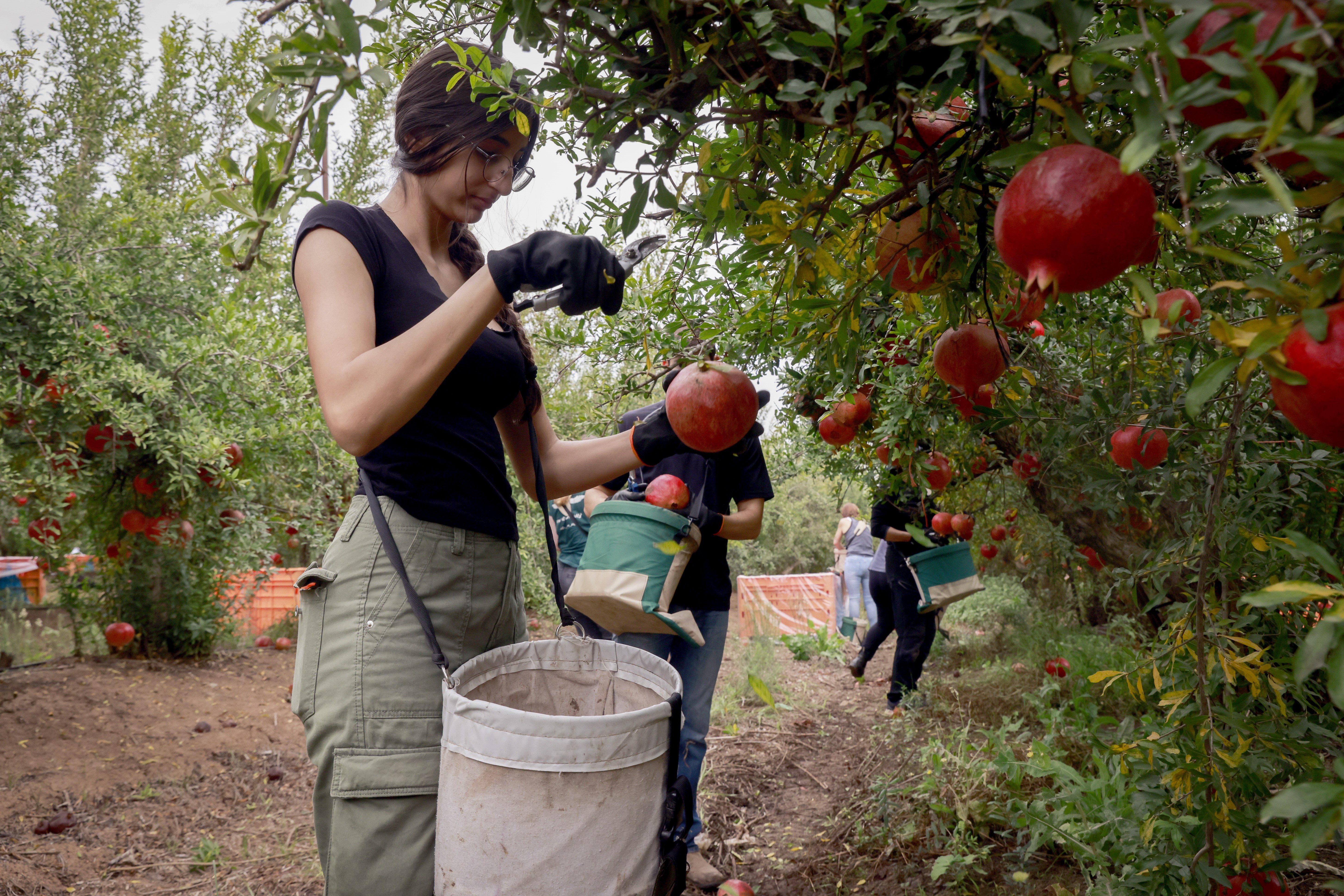
The Link Between Labor Shortages and Israel’s Strategic Security
Written By: Daphna Aviram-Nitzan
The government of Israel must recognize the strategic importance of agriculture, the food sector, and other industries producing goods that are vital for the country’s security and for the continued functioning of the business sector during times of emergency and war

Emergency Governments in Israel
Written By: Dr. Assaf Shapira
As the brutal attack from Gaza continues, the possibility of a change in the composition in the government is being bandied about. What kind of government is possible and what has been done in the past?

The government must stop the judicial legislation to prevent further damage to the economy
Written By: Prof. Karnit Flug, Prof. Jacob Frenkel
Earlier this year, we published an article warning against the dangers of the judicial reforms, to our regret, many of the negative developments about which we warned at the beginning of the year have already come to pass.
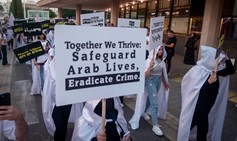
The Abandonment of Arab Israelis
Written By: Dr. Muhammed Khalaily
Ditching the 5-year plan for the Arab sector will have adverse long-term effects on the Arab's sector ability to integrate into Israel's shared society.

On the link between reasonableness and incapacitation
Written By: Prof. Suzie Navot,
Less than 24 hours after the Knesset passed the “Reasonableness Law” the attorney general filed her professional opinion to the Supreme Court on an entirely different matter: the “Incapacitation Law.” What do the two amendments share in common?

Protests are Necessary—But So Is Decentralization
Written By: Dr. Assaf Shapira
When Israeli liberals depend solely on the Supreme Court for checks and balances, they are taking a big risk. It is essential to add veto points as human rights in Israel should not depend on the Supreme Court alone - decentralization of government is key.

The Economic Implications of the Coalition’s Legislative Initiatives
Written By: Prof. Itai Ater, Dr. Tzachi Raz, Dr. Yannay Spitzer
This paper seeks to elucidate the economic consequences of the judicial overhaul. It approaches the topic through the lens of the new institutional literature in economics, which has extensively addressed the link between democratic institutions and the economy in recent decades.

No professionalism, no expertise – and no women
Written By: Adv. Anat Thon Ashkenazy
The Authority for the Advancement of Women's Status and agencies like it are being gutted along with protections for women

The Link Between Education, Mobility, and High Tech - Eli Hurvitz Conference Day 2
“I want to maintain a strong, independent system of higher education” Yoav Kish, Minister of Education

High Cost of Living | Eli Hurvitz Conference
High cost of living in Israel is addressed at the Eli Hurvitz Conference on Economy and Society.
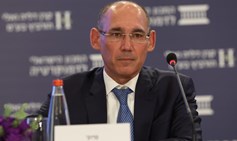
Where Is The Israeli Economy Headed? | Eli Hurvitz Conference
Bank of Israel Governor: “the Israeli economy has experienced a significant shock in recent months following the proposed changes to the judicial system... continued uncertainty has significant economic costs.”

The High Cost of Living in Israel
Written By: Daphna Aviram-Nitzan, Prof. Itai Ater, Nadav Porat Hirsh
40% of Israelis aged 25–44 cited the high cost of living as the issue that concerns them most. 80% of them have had to give up one or more item of expenditure, particularly leisure activities and vacation in Israel and abroad, and about 30% have refrained from buying basic items, food, or cars.

Israeli Work Life Post Covid
Written By: Daphna Aviram-Nitzan, Yarden Kedar, Roe Kenneth Portal
New survey of Israeli workers reveals changes in levels of satisfaction post COVID pandemic: Most workers in Israel are satisfied with their work-life balance, despite the fact that half of them work more than their official number of hours; around a third report difficulty with functioning in family life

The Repeal of the Tax on Disposable Utensils: What Lessons can we Learn?
Written By: Prof. Yuval Feldman, Itamar Popliker
Even though the tax seems to have reduced the use of disposable utensils, its repeal demonstrates that a sustainable change in behavior requires additional measures, including running information campaigns tailored to the ultra-orthodox, making alternatives available, and encouraging their use.

Judicial Overhaul and Israeli Households
Written By: Daphna Aviram-Nitzan
The impact of the proposed changes to the judicial system on the financial balance of Israeli households: analysis of the M.O.F risk scenarios by income deciles

The Cost of Living in Israel: What do the Numbers Say?
Written By: Prof. Karnit Flug, Nadav Porat Hirsh, Roe Kenneth Portal
Over the past decade average real wage of Israeli workers increased by 25% - nevertheless their purchasing power is relatively lower than the OECD average

More Supply than Demand: Israel’s Labor Market
Written By: Daphna Aviram-Nitzan
Behind the record number of job openings, in an age of full employment and an economy with rapid growth, what steps can the government take to promote the inclusion of workers currently outside the job market and to help businesses?
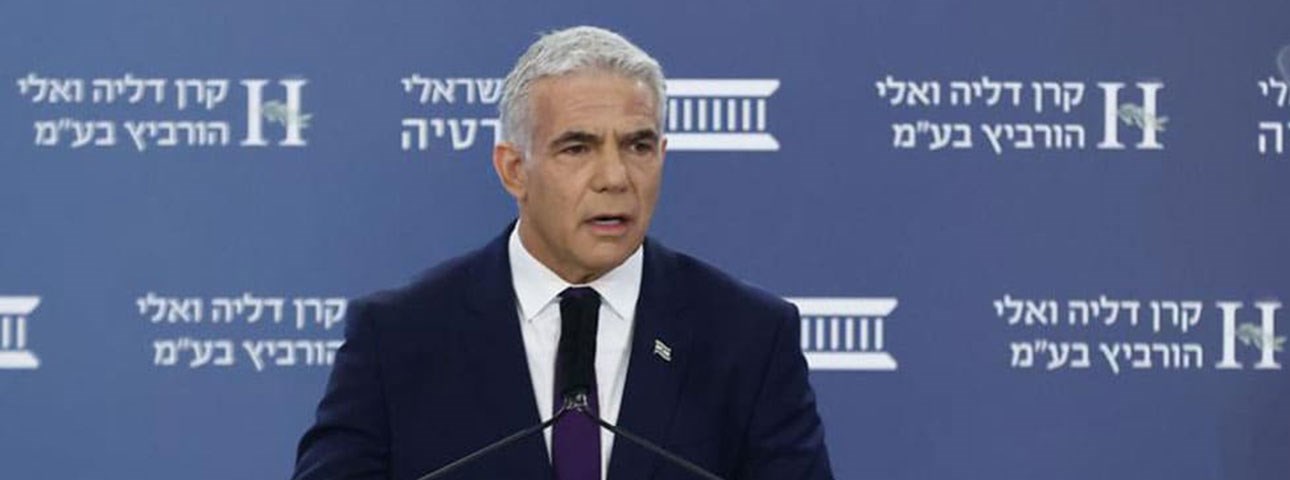
Eli Hurvitz Conference Day 2 Summary
“The issue I want to talk about is extremists versus moderates. Those who want to destroy and tear apart, versus those who want to build. And that’s what these elections are about. This is the struggle we have to win.” Alternate Prime Minister and Foreign Minister Yair Lapid
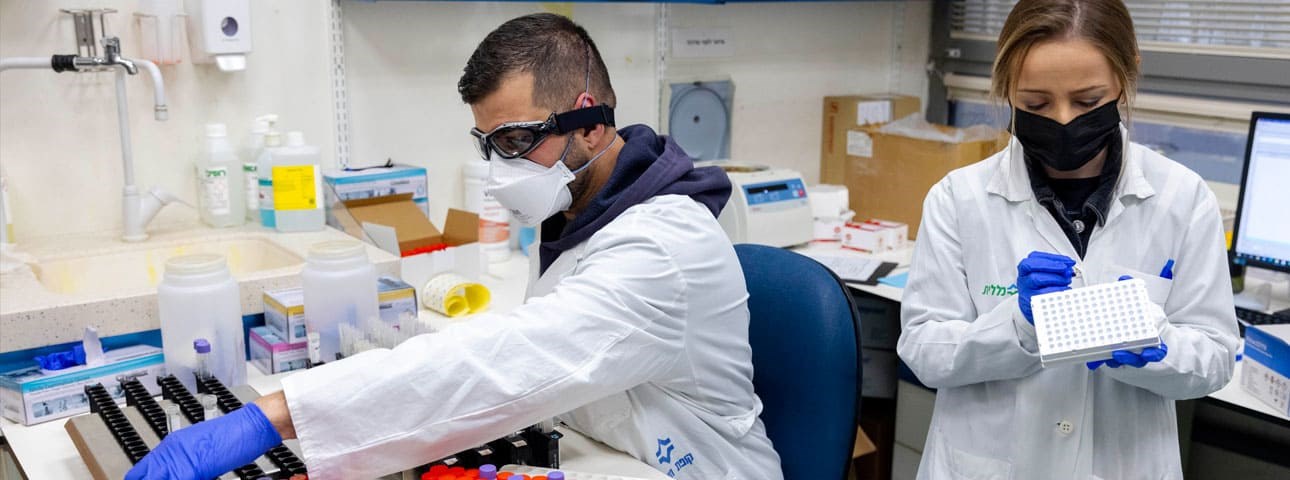
Israel’s Future Labor Market will Further Widen Gaps Between Jews and Arabs and Reduce Gender Gaps
Written By: Prof. Yotam Margalit, Gabriel Gordon, Zak Hirsch
A new study by IDI experts Prof. Yotam Margalit, Gabriel Gordon and Zak Hirsch finds that the Israeli Economy is transitioning towards occupations in which the main tasks require high analytical abilities and to a lesser extent interpersonal abilities. Occupations which mainly require routine-physical abilities are diminishing rapidly

Changes in the New Labor Market: A Tasks and Skills Analysis
Written By: Gabriel Gordon, Zak Hirsch, Prof. Yotam Margalit
The rapid rate of technological development requires an examination of the changes in demand for workers, specifically in terms of the tasks that make up different occupations. This study offers such an examination along with recommendations for action
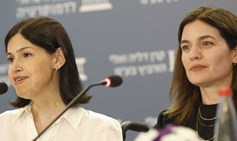
Eli Hurvitz Conference Day 1 Summary
Tamar Zandberg Minister of Environmental Protection: “On Sunday, together with Minister Karine Elharrar and Minister Orit Farkash-Hacohen, we will bring a precedent-setting NIS 3 billion government decision to promote innovation & climate change. This decision includes many of the removal of barriers proposed by the Israel Democracy Institute”
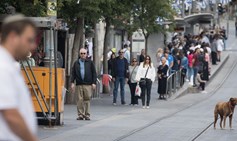
Public Opinion Survey on Socioeconomic Issues
Written By: Prof. Karnit Flug, Dana Bublil, Yarden Kedar, Roe Kenneth Portal
Despite the health and economic crisis that has affected Israel since March 2020, the share of those who say they are satisfied with their economic situation (“somewhat satisfied” or “very satisfied”) has risen from 28% in the summer of 2019 to around 33% in May 2022.
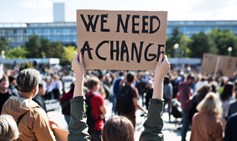
Climate Innovation Report
Written By: Daphna Aviram-Nitzan
This report presents the results of the work led jointly by the Israel Democracy Institute and the Israel Innovation Institute - a proposal for government policy to promote climate innovation
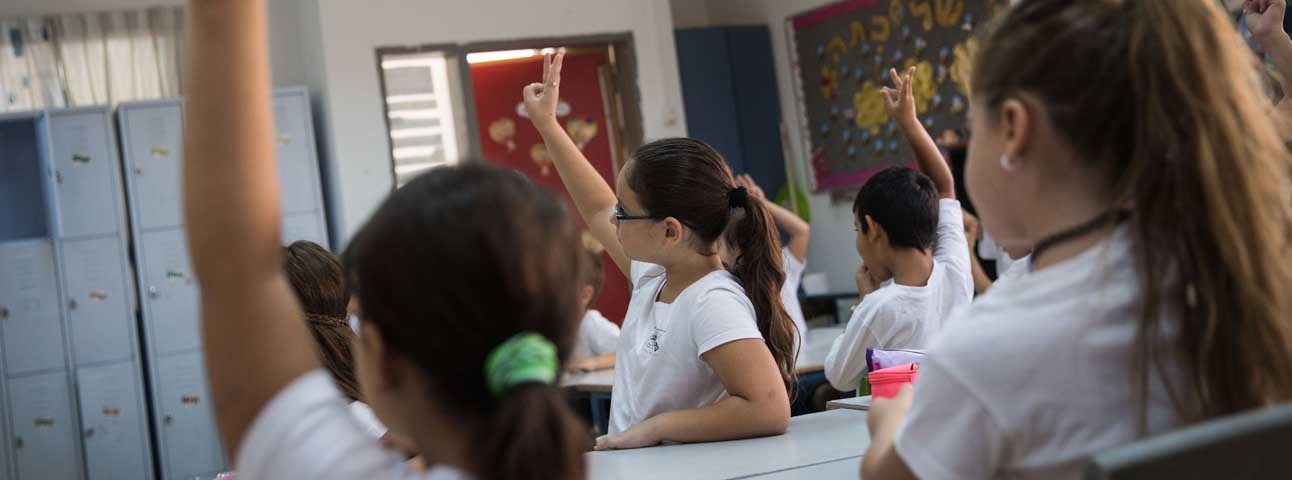
Intergenerational Mobility in Israel is Relatively Low
Written By: Prof. Karnit Flug, Gabriel Gordon, Roe Kenneth Portal
New IDI study finds that only 14% of Israeli children in the bottom income quartile will reach the top quartile

Innovation as a Growth Accelerator
Written By: Adv. Rita Golstein-Galperin, Gilad Be’ery, Dr. Shaul Hartal, Ayelet Kol, Lior Levi
Israel hi-tech sectors is one of the largest and most innovative in the world, accounting for around 10% of jobs in the country - but innovation to be limited to what is still a minority of the workforce.
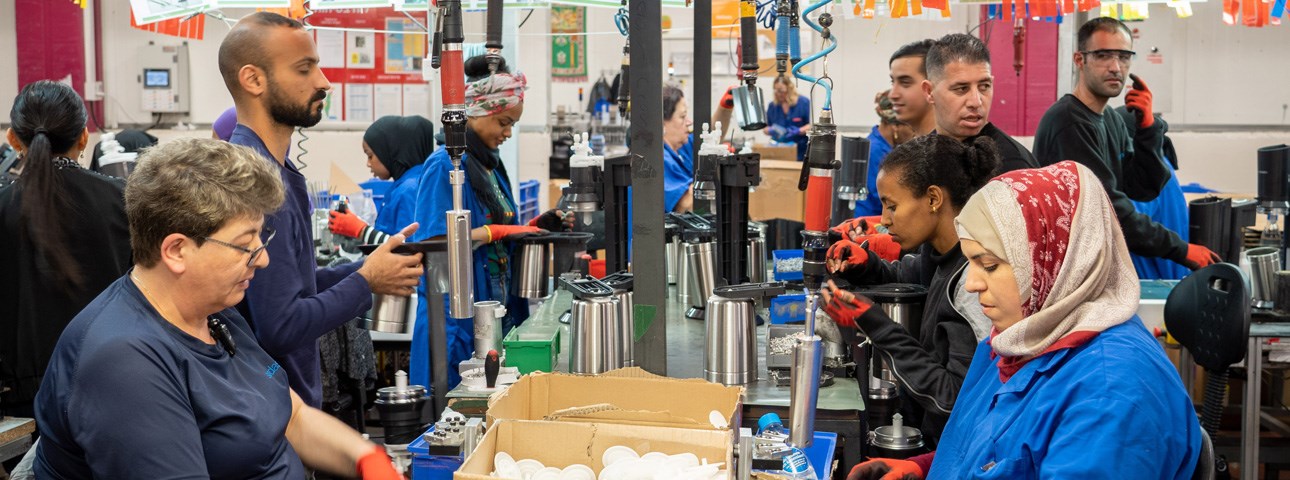
Intergenerational Mobility in Israel: Do Gaps Get Smaller from Generation to Generation?
Written By: Gabriel Gordon, Prof. Karnit Flug, Roe Kenneth Portal
This study examines patterns of intergenerational mobility and found considerable differences between different population groups

Taxing Sugary Beverages
Written By: Prof. Yuval Feldman, Rotem Shpigler
How will Israelis react to a new tax on sugary drinks? A special IDI survey found that only a quarter of the public said that they would reduce their consumption of such drinks if they are taxed up to half a shekel, but a significant majority said they would limit their consumption if the tax exceeds two shekels.

Is Israel Also Experiencing a “Great Resignation”?
Written By: Daphna Aviram-Nitzan, Roe Kenneth Portal
The "great resignation" that has swept the US and UK in recent months is one of the symbols of the recovery from the pandemic. Is this trend taking place in Israel too?
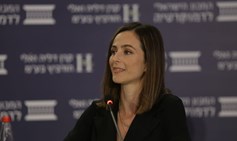
The Labor Market in the Post-COVID Era
Meirav Cohen, Minister of Social Equality: “Employers should be given incentives to choose older workers”

Formulating Climate Policy: The Private and Public Sectors Join Forces
Minister of Environmental Protection Tamar Zandberg, Minister of Energy Karin Elharar, Minister of Transportation Merav Michaeli and Minister of Economy Orna Barbibai in a joint declaration at IDI's Conference: "We will cooperate on Israel's climate policy, to lead to an 85% reduction in Israel's greenhouse gas emissions by 2050."

The Macroeconomic Priorities of the New Government
Avigdor Liberman, Minister of Finance, opened the first day of the 2021 Eli Hurvitz Conference on Economy and Society, saying: “We are after more than three years of political crisis without a budget, reforms or legislation. The economy ran on a kind of autopilot. We will now pursue a responsible policy, without deep cuts.
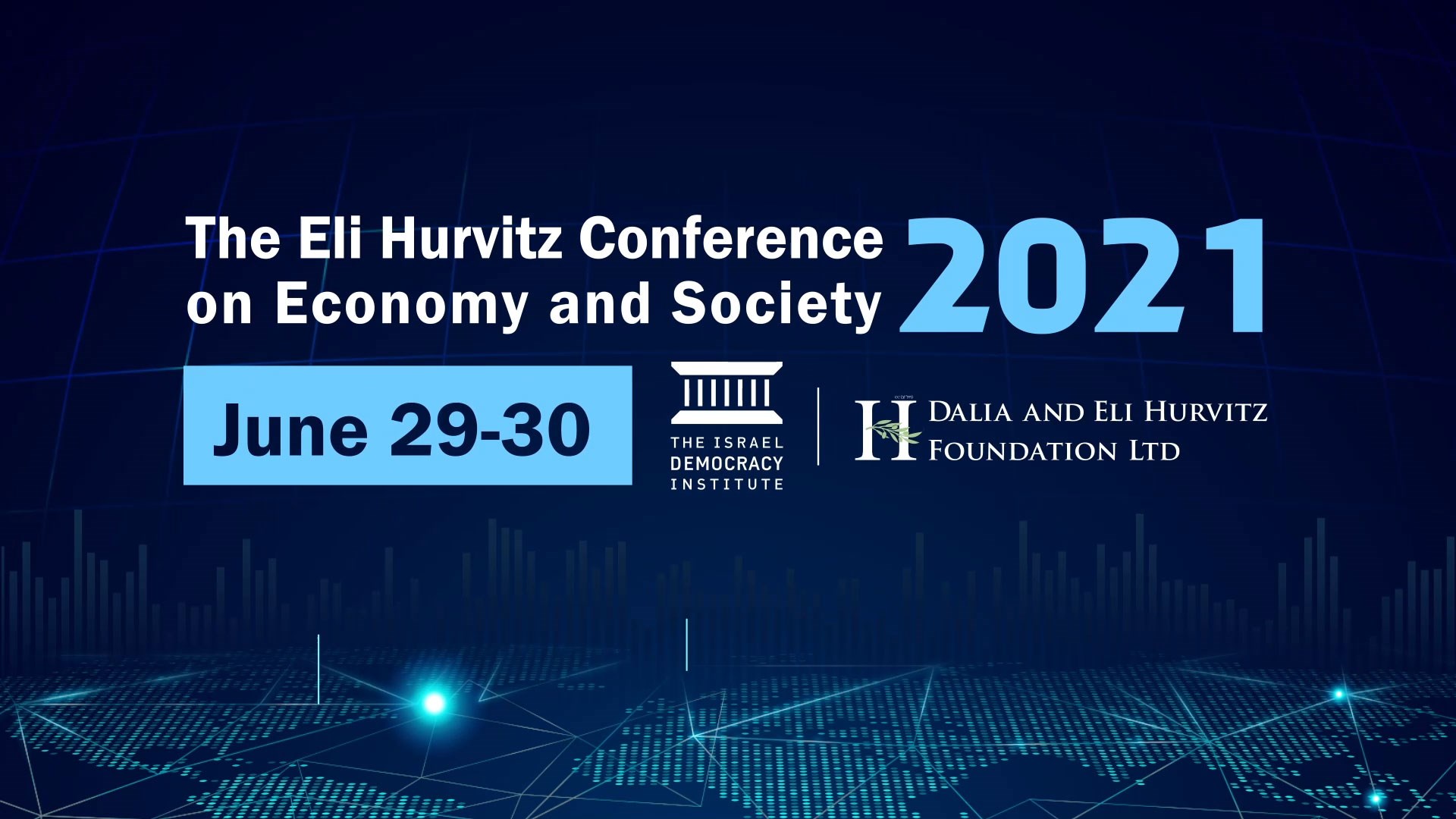
Israel's Macroeconomic Challenges in the Post-COVID World
“Two challenges hover above the rest – a stock market bubble and inflation”
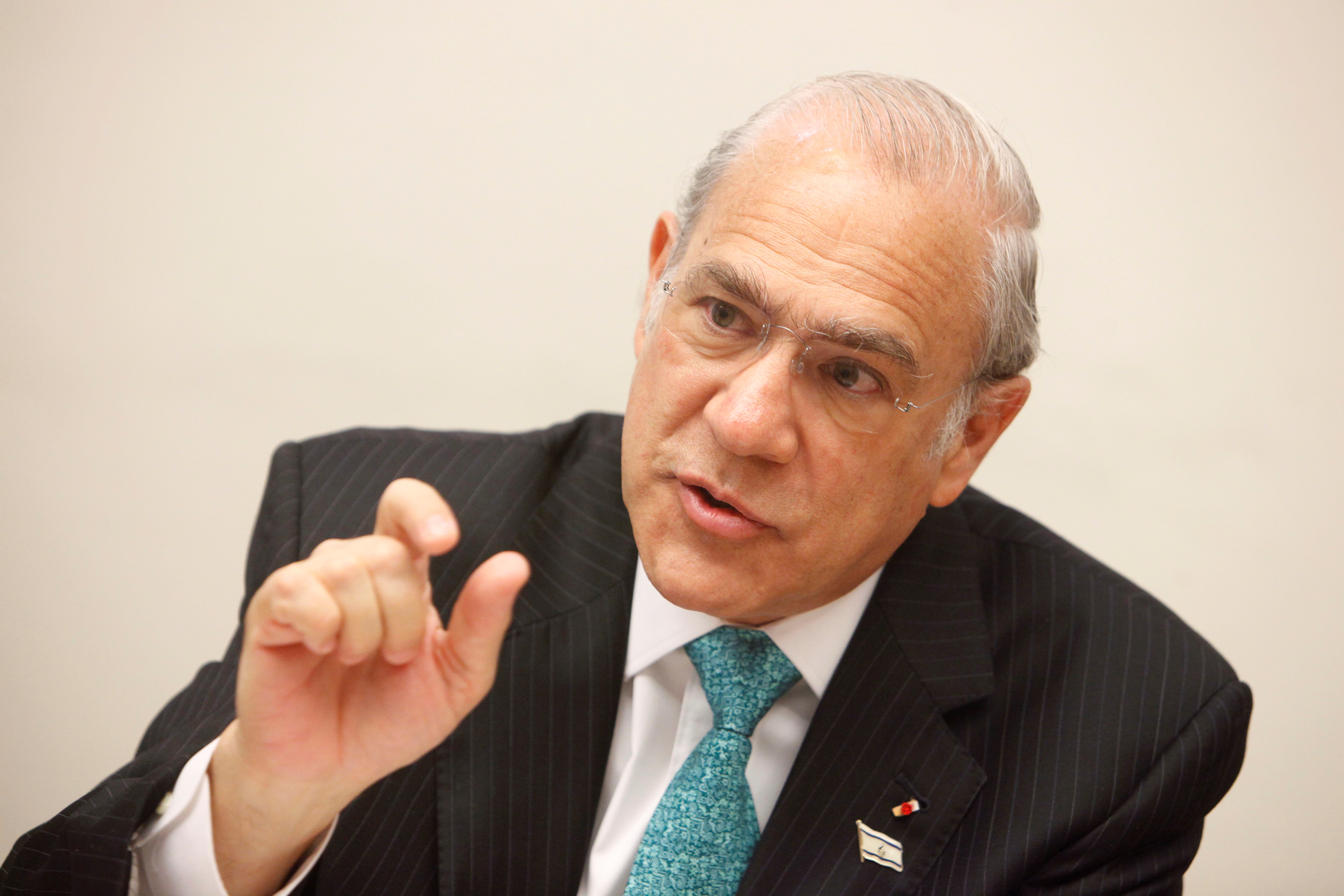
So Long Ángel, and Thanks for All the Reforms
Written By: Adv. Rita Golstein-Galperin
Outgoing OECD Secretary General Ángel Gurría is a close friend of Israel whose name has become synonymous with the organization itself. Gurría's long tenure saw Israel implement a number of important OECD reforms, will this continue after his departure?

Israel at the Precipice: Will the March Election Bring an End to Israel’s Political and Economic Crisis?
Written By: Yohanan Plesner , Prof. Karnit Flug, Dr. Jesse Ferris
As Covid-19 continues to take Israeli lives and ravage its economy, seemingly immune to Israel’s impressive vaccination campaign, IDI President Yohanan Plesner and Professor Karnit Flug, Vice President, Research and William Davidson Senior Fellow for Economic Policy joined IDI's VP of Strategy Dr. Jesse Ferris on a JFN webinar to discuss the stakes and possible outcomes of Israel’s fourth election in less than two years.
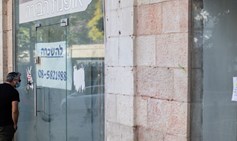
The Economic Impact of COVID: Survey Finds Decline in Financial Liquidity Among Israeli Workers
Written By: Yarden Kedar
A special IDI survey on the economic impact of the COVID crisis finds that worker's financial liquidity has declined sharply with 31% of respondents reporting that they had no liquid funds to support themselves.

Wave No. 3 is Here – We Must Learn our Lesson
Written By: Ron Tzur, Prof. Nissim Cohen
Politicians and healthcare practitioners alike must learn from their experience and formulate strategy before it is too late.
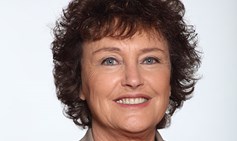
COVID and the Israeli Economy: A Bittersweet Reckoning
Written By: Prof. Karnit Flug
Prof. Karnit Flug unpacks the effects of the COVID pandemic on the Israeli economy: Does the fact that Israel is a small and centralized economy work in its benefit and how quickly will it bounce back?

Elections Should be Avoided
Defense Minister Benny Gantz: "Elections should be avoided, there should be a budget and a functioning government; I have no intention of replacing Avi Nissenkorn – he is doing a good job and we are committed to preserving democracy and judicial institutions."

Local Government vs. Central Government
Dr. Aliza Block, mayor of Bet Shemesh:"The idea that a senior official sits in Jerusalem and knows how to decide for me which streets or stations to close is fundamentally wrong."

2020 Eli Hurvitz Conference on Economy & Society – Recap of Day 3
The 2020 Eli Hurvitz Conference on Economy and Society concluded today following special addresses from the Alternate Prime Minister Benny Gantz and Chair of the Opposition MK Yair Lapid as well as discussions and deliberations with Minister of Health Yuli Edelstein, senior WHO and local health officials and mayors from throughout Israel.
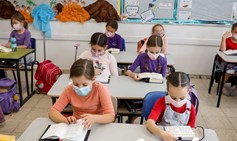
2020 Eli Hurvitz Conference on Economy & Society – Recap of Day 2
The second day of the 2020 Eli Hurvitz Conference on Economy and Society concluded following discussions and deliberations with IDI experts, leading academics, key regulators and senior officials from the public and private sectors.

The Education System: From Crisis to Opportunity
As part of the Israel Democracy Institute’s Eli Hurvitz Conference on Economy and Society, a panel took place with the participation of Minister of Education Yoav Galant and a number of education experts, focusing on preparing the education system for the post-COVID reality. Eli Hurvitz, executive director of the Trump Foundation, served as chair of the panel.

The Israeli Workforce: From Crisis to Opportunity
The labor market panel at the Israel Democracy Institute’s Eli Hurvitz Conference on Economics and Society dealt with the challenges and opportunities of the employment market in the post-Covid era.

How Willing are Israelis to Reduce Carbon Emissions? Survey
A new survey conducted by the Israel Democracy Institute (IDI) examined Israeli's attitudes toward climate change and the possible steps to stem the tide.
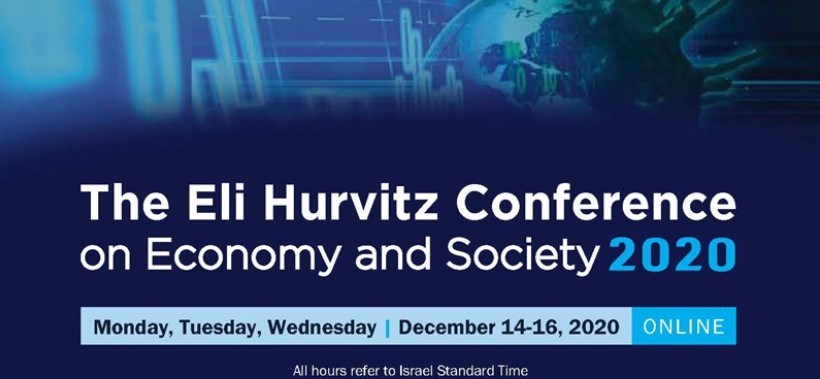
2020 Eli Hurvitz Conference on Economy & Society – Recap of Day 1
The first day of the 2020 Eli Hurvitz Conference on Economy and Society included discussions and deliberations with the Finance Minister Israel Katz, Prof. Amir Yaron the Governor of the Bank of Israel, Prof. Avi Simhon, the Chair of the National Economic Council, and senior private sector leaders from Israel and abroad.

From Global to Local: The Impact of the Global Crisis on Israel
As part of the Israel Democracy Institute’s Eli Hurvitz Conference on Economy and Society, a panel was held (Dec. 14th) on the implications of the global crisis on Israel, including the labor market and the question of the budget, US–Europe–Israel relations in the Biden era, changes in times of crisis and routine, and preparedness for future challenges.

Regulators in Conversation: Financial Risk and Climate Change
"If you look at the S & P, close to 86% of companies today report on Environmental, Social, and Governance (ESG) compared to a decade ago" said Anat Levin, CEO, BlackRock Israel, on the topic of how the global financial market adapts itself to ESG

From the Corona Crisis to the Climate Crisis
Chen Lichtenstein, Chief Financial Officer, Syngenta Ventures: “Tthe challenges and complications a small country like Israel faces, is a drop in the ocean by comparison. Israel should be able to easily make decisions of the same explicit impact – the word zero is critical.”

D-Gs in Conversation: A Government Vision for Israel 2050
For the past two years, the Israel Democracy Institute, in collaboration with the Ministry of Environmental Protection, the Ministry of Transport, the Ministry of Energy, the Ministry of Economy, the Ministry of Finance, and the OECD, has been leading a multi-sectoral and cross-ministerial process.

From Recession to Growth: Macroeconomic Policy
The Israel Democracy Institute’s Eli Hurvitz's Conference on Economics and Society opened today with a session titled "From Recession to Growth: Macroeconomic Policy" focusing on ways to accelerate Post-COVID economic growth in Israel.

Working from Home: A Survey of Patterns and Attitudes
Written By: Daphna Aviram-Nitzan, Rachel Zaken
One of the very few pieces of good news resulting from the corona crisis is the increase in people working from home (WFH). Unfortunately, workers from lower socioeconomic groups are not benefiting from this change.
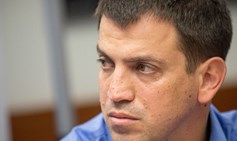
Meridor's Resignation Raises Serious Concerns
“Meridor's resignation raises serious concerns that management of the worst economic crisis Israel has encountered in recent decades is characterized by a lack of systematic policies or priorities"

Climate Crisis and Corona Virus Special Survey
Written By: Daphna Aviram-Nitzan
Do Israelis want their government to improve the economy's readiness for the climate crisis? IDI's special survey on public attitudes to the climate crisis says that an overwhelming majority (89%) says "yes."

How to Generate Demand for Workers
Written By: Daphna Aviram-Nitzan
A growing number of countries around the world have realized that vocational training and subsidies for the training period can increase the demand for workers. Israel's government should follow this lead, while at the same time accelerating the pace of development of infrastructure projects, to increase the demand for skilled workers.

Working from Home: Pre-and Post-Coronavirus
Written By: Daphna Aviram-Nitzan, Rachel Zaken
The coronavirus has made working from home much more prevalent, and has many advantages, including improving efficiency and providing workers with more flexibility. But how do we ensure that it does not increase wage disparities and provide even more advantages to those who are already the higher earners? IDI experts weigh in with recommendations to ensure that all sides benefit

The Crisis Has Hit at the Core of the Labor Market
Written By: Daphna Aviram-Nitzan
The current crisis threatens the heart of the labor market with 400,000 workers between the ages of 35-54 designated as "temporarily absent from work" due to the coronavirus

Coronavirus and Unemployment in Israel
Written By: Daphna Aviram-Nitzan
Daphna Aviram Nitzan presents an analysis of unemployment in Israel in the wake of the coronavirus pandemic.

The Coronavirus: Israel's Economy and Economic Policy
Written By: Prof. Karnit Flug
Prof. Karnit Flug's press briefing today focued on the Coronavirus’ effect on the Israeli economy and policies that could mitigate the damage inflicted by the pandemic.

The COVID-19 Crisis - Economic Impact and Economic Policies
Written By: Prof. Karnit Flug
What will be the economic ramifications of the coronavirus outbreak on the Israeli economy? Prof. Karnit Flug explains.

Karnit Flug Named William Davidson Fellow
The Israel Democracy Institute Names Former Bank of Israel Governor Karnit Flug William Davidson Fellow - new partnership will focus on ensuring Israel’s continued economic vitality.
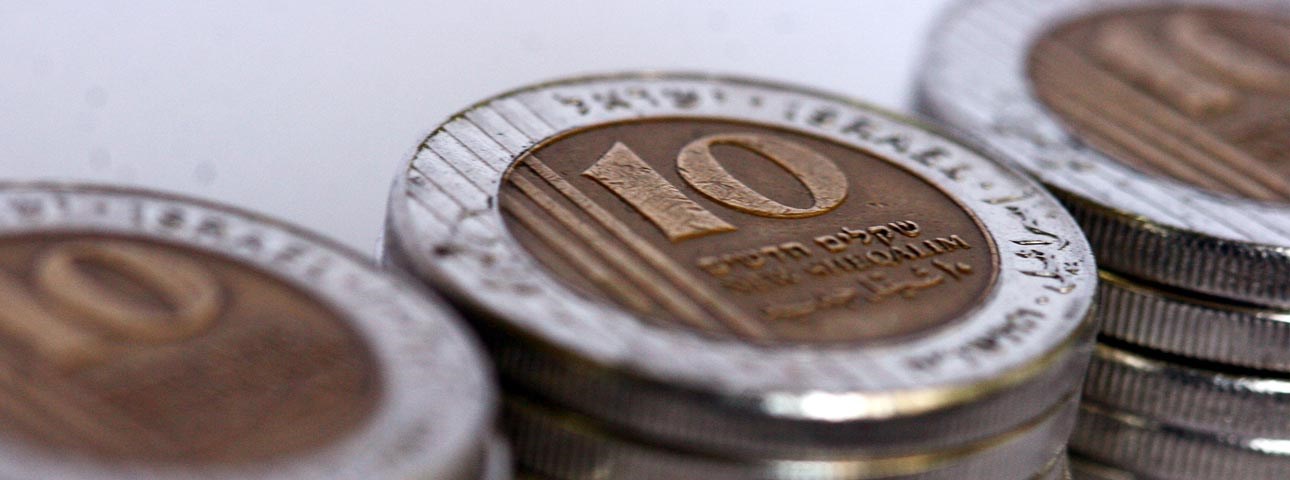
The Israeli Economy: A Report Card
Written By: Prof. Karnit Flug
Prof. Karnit Flug, former Governor of the Bank of Israel and currently Vice President for Research at the Israel Democracy Institute, analyzes the strengths and weaknesses of the Israeli economy.

Human Capital in Israel
Developing human capital in Israel is the key to narrowing the labor productivity gap as a key to reducing income disparities
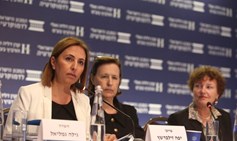
How Do We Adapt Our Labor Agreements to the 21st Century?
Eli Hurvitz Conference on Economy and Society – First Day, Second Session
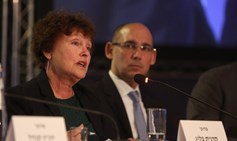
Ability to Make Economy Related Decisions Impaired
Prof. Karnit Flug, Vice President of IDI and Former Governor of the Bank of Israel spoke at the 2019 Eli Hurvitz Conference on Economy and Society: “With no government in place, the ability to make economy-related decisions is impaired. In the current situation, what is done depends entirely on what the Knesset Finance Committee is prepared to do."

Israel is in Danger of Becoming a Weakened State
Benny Gantz, Chair of the Blue and White party and former IDF Chief of Staff spoke at the 2019 Eli Hurvitz Conference: "Government ministers bicker daily with the professional echelon - a situation that harms Israelis"
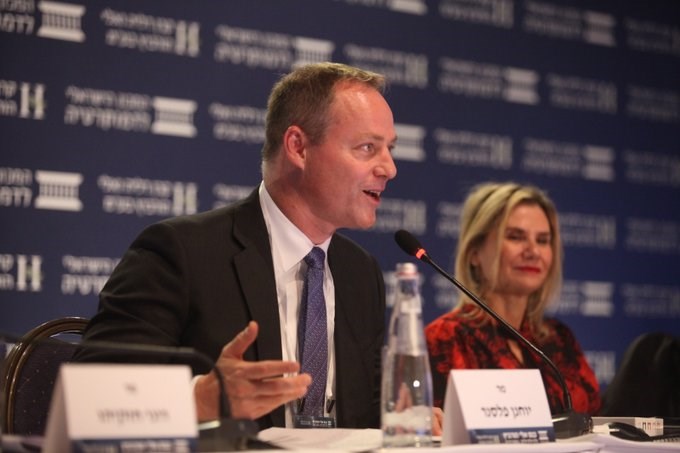
Israel’s Economy: Island of Stability with Troubling Trends
Yohanan Plesner, President of the Israel Democracy Institute and Prof. Eugene Kandel, CEO Start-Up Nation Central, open the two day conference, welcoming senior executives from the public and private sectors.

Using Ex-ante Pledges to Reduce Dishonesty and Improve Regulation
Written By: Dr. Eyal Pe'er, Prof. Yuval Feldman, Omer Selivansky Eden, Daphna Aviram-Nitzan
Reducing the regulatory burden is a key objective for many government ministries -but how can this be achieved while maintaining honest and ethical behaviour

The Coming Capitalist Revolution
Written By: Prof. Yedidia Z. Stern
Profit remains the ultimate objective, but the focus should be on profit for all those with a stake in a company, and not just its shareholders

Ease of Doing Business 2020 Index
In response to the Ease of Doing Business 2020 index that was published this morning, Daphna Aviram-Nitzan, director of the Center for Governance and Economics at the Israel Democracy Institute, who leads the regulation reduction project at the Institute, commented on Israel moving up 14 slots to the 35th place after 5 points improvement last year.

Economic Policy - Professional Independence and Long Term Planning
Excerpts from the presentation of Prof. Karnit Flug, IDI’s newly appointed Vice President, at the ‘Globes’ Governors Conference”
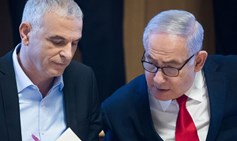
Quarter of the Population Gives Government's Policies a Failing Grade
Two and a half weeks ahead of the elections, a special IDI survey reveals that the Israeli public gives government economic policies a failing grade and supports increasing the budgets allocated to health, education, welfare, and public transportation services

Adapting to the Future Job Market
Written By: Daphna Aviram-Nitzan, Aharon Aharon, By: Alan Rosenbaum
Reframing the eco-system to prepare for Israel’s job market of the future.

Israel Climbs Five Spots in the World Bank’s Ease of Doing Business Index
Israel improved by five spots over last year in the index of 190 countries. In first place is New Zealand, followed by Singapore, Denmark, Hong Kong, and South Korea. The Ease of Doing Business Index is an international indicator of how easy it is to do business in various countries.
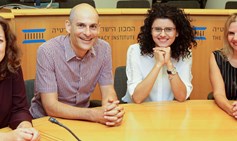
Meet the Next Generation of IDI Leaders
Written By: Rachel Cohen, Adv. Alona Vinograd, Dr. Nasreen Haddad Haj-Yahya, Daphna Aviram-Nitzan, Dr. Gilad Malach
Guaranteeing an independent Supreme Court. Integrating the Ultra-Orthodox into the IDF. Boosting participation of Arab women in the workforce. Improving the ease of doing business in Israel. These are some of the challenges facing IDI’s new cadre of program and center directors.
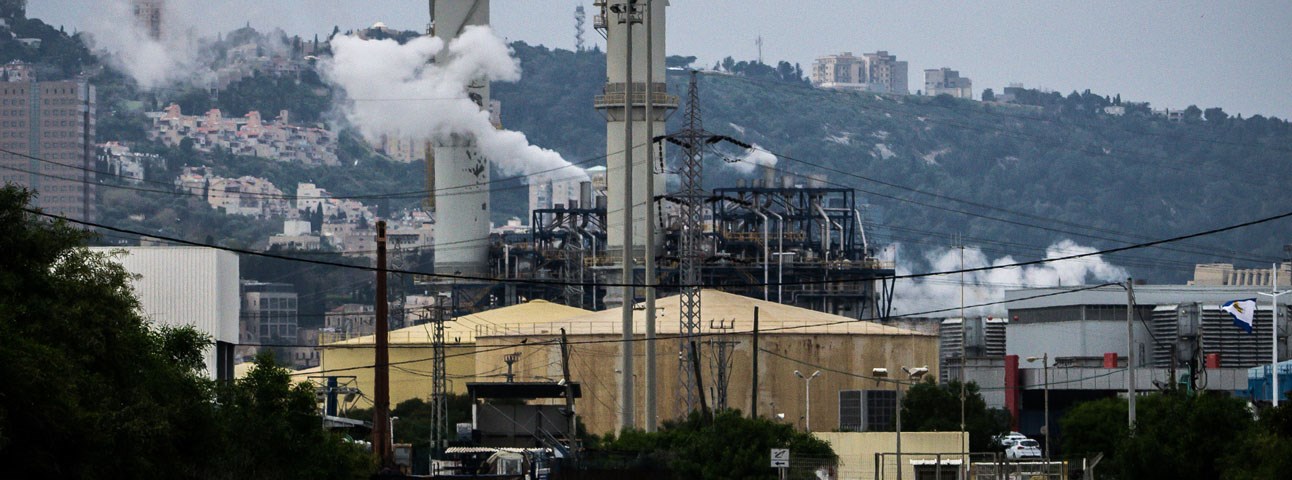
A Regulatory Roadmap for Investors: Current State and Recommendations for Improvement
Written By: Daphna Aviram-Nitzan
The “Regulatory Roadmap for Investors” was initiated against the backdrop of the heavy bureaucratic and regulatory burden with which the business sector must contend when establishing new manufacturing plants and doing business in Israel.
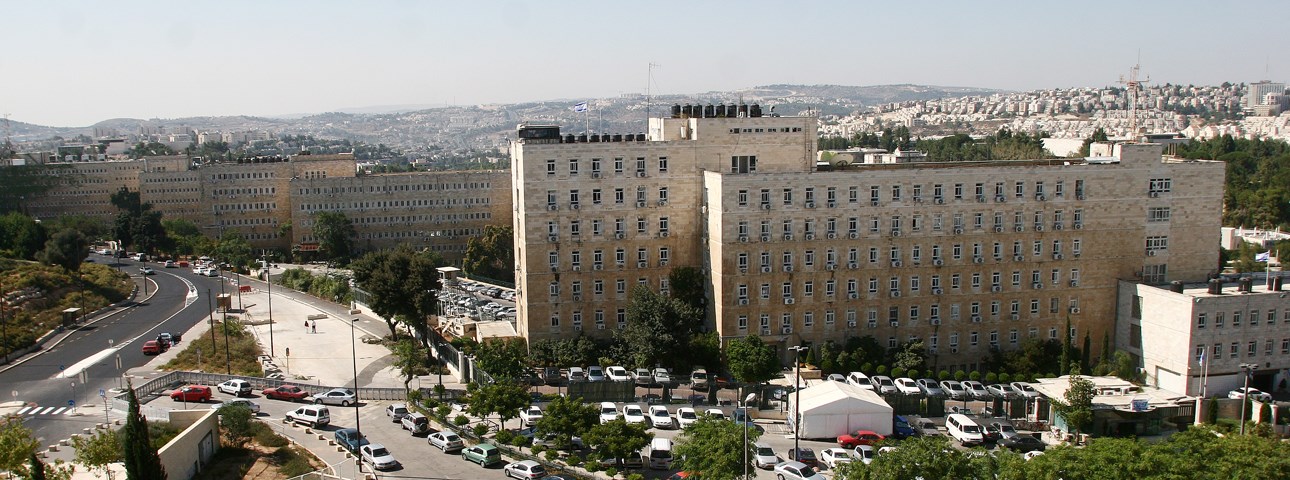
Untangling the Web of Bureaucracy and Regulation
Written By: Daphna Aviram-Nitzan
Israel’s ranking on international indices of regulatory and bureaucratic burdens has been far from flattering - a closer look reveals the difficulty in complying with the demands of the complexity and inefficiency of Israel’s bureaucracy and regulatory system.
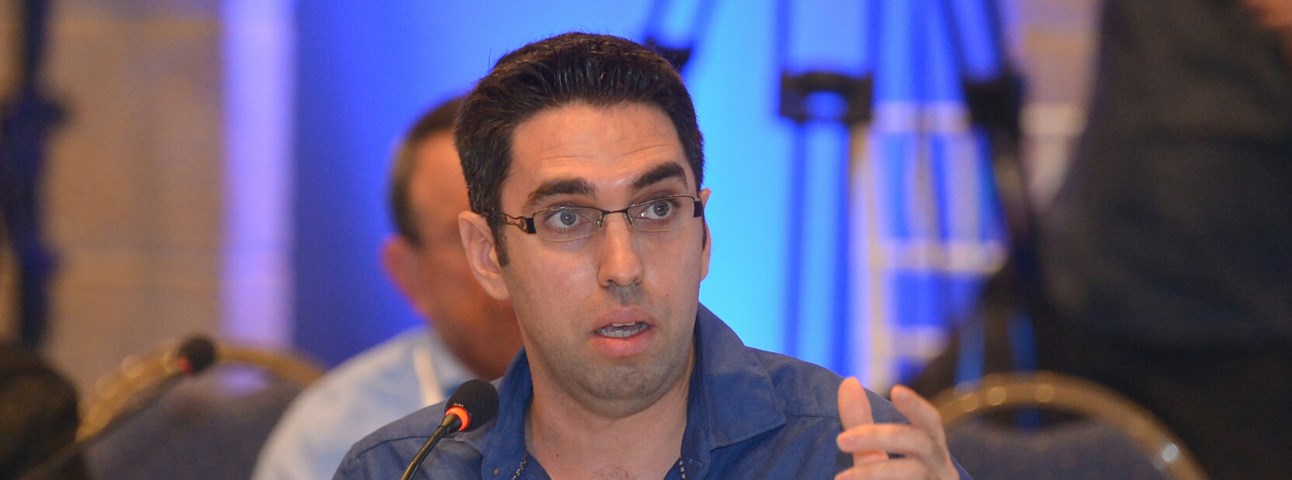
Israel needs a Paradigm Shift: Greater Compatibility Between Human Capital and the Economy
Written By:
Israel suffers from a shortage of skilled workers in manufacturing industries and hi-tech and an overflow of the service sector; priorities in the allocation of public resources for the training of human capital must be changed to better fit the needs of the economy.
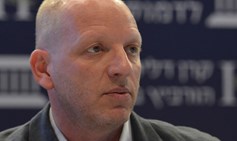
Israel’s future labor market needs updated models
Written By: Prof. Yotam Margalit
The number of vacation days in Israel is among the lowest in the world. Research by Prof. Yotam Margalit presents a new model which will ensure a minimum of 18 vacation days for each worker.

Top OECD Official: Israel Must do more to Integrate Arabs and ultra-Orthodox into the Economy
Dr. Peter Jarrett, the head of the Country Studies Division at the OECD, says the government must do more to integrate all Israelis into the economy if it is to continue to prosper and grow. "Boasting that Arabs and Ultra-Orthodox Aside, Israel's Situation is Excellent - is Simply shortsighted and Foolish."

Mission: Open a factory in Israel in 18 months
An ambitious plan aims at slashing the 4-6 years it currently takes to pass all the regulatory hurdles in Israel
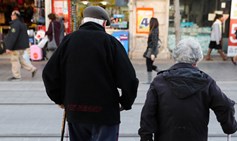
Living in Dignity
Written By: Prof. Eytan Sheshinski, Rachel Zaken
Our Democracy Index shows that while Israel’s citizens love their country and are optimistic about its future, they feel a lack of confidence about their personal futures.

Two Economies - One Society: New Survey
Survey to serve as backdrop for discussion at Eli Hurvitz Conference on Economy and Society – June 19 and 20

Flexonomics
Written By: Ilan Evyatar
In a dynamic labor market, challenged by technological disruption and increasing longevity, flexibility is key.
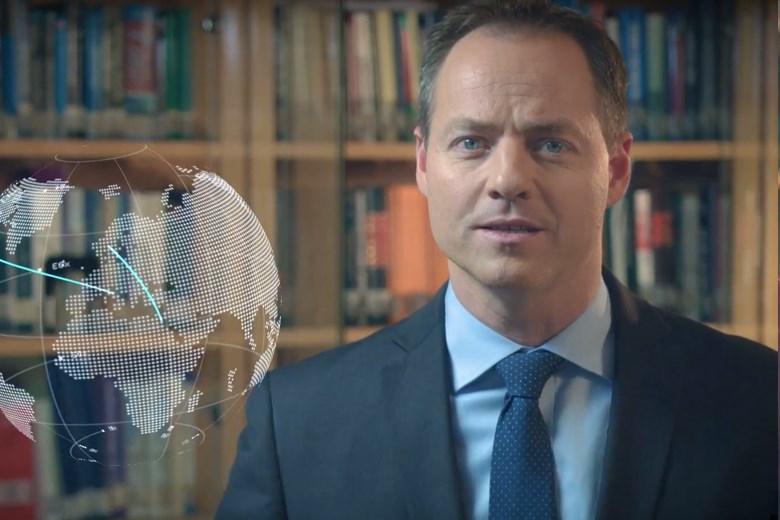
Ensuring a Vibrant Democracy
Written By: Yohanan Plesner

Gotta Have Faith: The Knesset's Top Priority for 2017
Written By: Yohanan Plesner
The Knesset’s top priority for 2017 should be to restore the Israeli public’s belief in its political institutions.

Is Israeli Society Frail Or Flourishing?
Written By: Prof. Yedidia Z. Stern
Is Israeli democracy weak, fragile and on the brink of collapse, or is it robust, stable and resilient?

Bank of Israel's Karnit Flug: 'Ensure More Ultra-Orthodox Males Receive a Complete Secular Education'
srael's GDP is 40 percent lower than that of the U.S. and its level of productivity is 33% less than most OECD countries, according to a presentation by Dr. Karnit Flug, governor of the Bank of Israel.

The Road to Hi-Tech Runs through Taibeh
Written By: Dr. Nasreen Haddad Haj-Yahya
The integration of talented Arab employees into Israel’s hi-tech sector could relieve the human-resources shortage for employers. Encouraging Arabs to enter the hi-tech industry could improve their economic situation significantly, which would reduce inequality and contribute to a reduction of social tensions in the Arab community.

Shemitat Kesafim: The Year of Escape from Debt
Written By: Prof. Benny Porat
Dr. Benny Porat discusses the precept of debt cancellation during the sabbatical year (Shemita) and proposes ways in which to update this practice to suit the economics of contemporary Israel and create a model society.
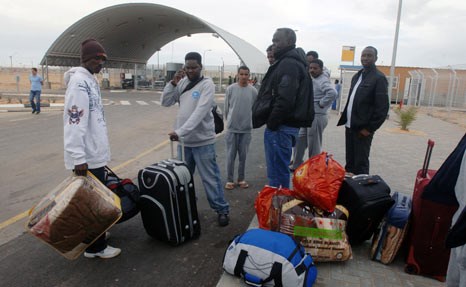
Detention of African Asylum Seekers in Israel: Welcome to Round Three
Written By: Prof. Reuven (Ruvi) Ziegler
On December 8, 2014, just before the Knesset dissolved itself to prepare for early elections, it enacted the Law for Prevention of Infiltration and Ensuring the Departure of Infiltrators from Israel. IDI's Dr. Reuven (Ruvi) Ziegler reviews this development.
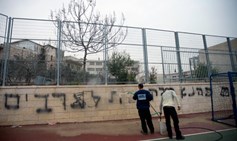
A Four-Step Plan to Combat Hatred between Jews and Arabs in Israel
Written By: Yair Sheleg
IDI Research Fellow Yair Sheleg outlines four steps that can allay fears, contribute to dialogue, combat hatred, and improve relations between Jews and Arabs in Israel

Legal Opinion on the Israel Hayom Law
Written By: Prof. Mordechai Kremnitzer, Dr. Tehilla Shwartz Altshuler
A summary of a legal opinion opposing the "Law for the Advancement and Protection of Print Journalism in Israel," which would prohibit the distribution of a full-sized daily newspaper in Israel free of charge.

Transparency in Local Authority Budgets
Written By: Dr. Tehilla Shwartz Altshuler
Dr. Tehilla Shwartz Altshuler discusses the challenges to transparency in the budgets of Israel's local authorities, including the need to make budgets accessible, to enable searches within budgets, and to facilitate comparisons between the budgets of different authorities.
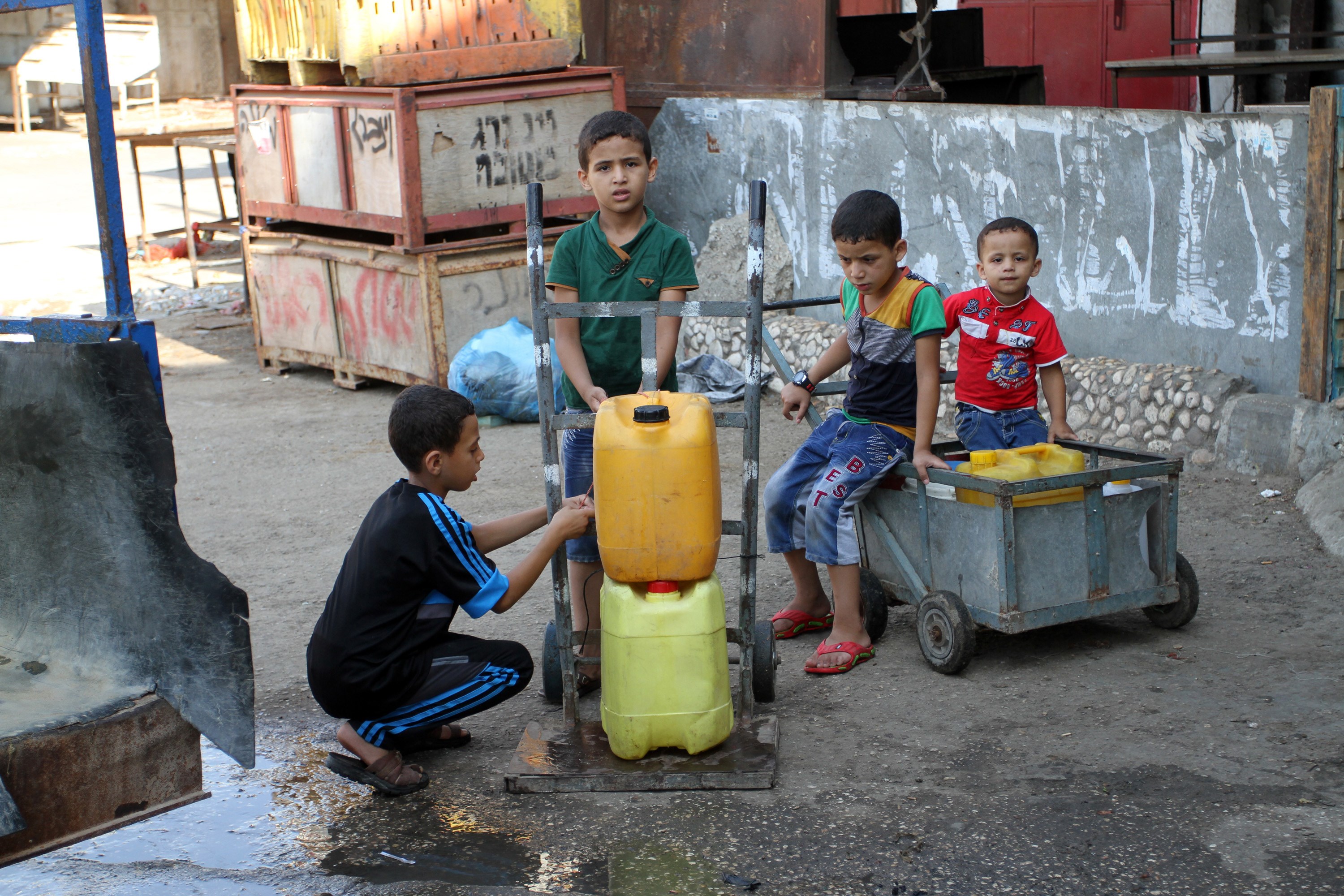
The Admissions Committees Ruling: A Lack of Ripeness or Refusal to Decide?
Written By: Dr. Amir Fuchs
Dr. Amir Fuchs discusses the Israeli High Court of Justice's decision to uphold the "Admissions Committees Law," which allows small communities to reject applicants due to a lack of social suitability.

Shmita: Rest, Share, Release
Written By: Prof. Yedidia Z. Stern
An exploration of the existential, social, and economic dimensions of the Shmita year, that calls for bringing together social, moral, cultural, religious and national forces to implement the idea of Shmita in non-agricultural and national contexts in Israel.

Celebrating Independence: The Vision of Professor Reuven Feuerstein
Written By: Benjamin (Benny) Lau
As Israel prepares to celebrate its independence, Rabbi Dr. Benjamin Lau and Ms. Shira Ruderman remind us of the need to bring people with disabilities into the circle of those who celebrate independence, drawing on the legacy of the late Prof. Reuven Feuerstein in this call for integration.
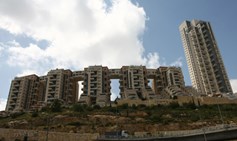
The Struggle against Government Corruption
Written By: Prof. Mordechai Kremnitzer
In an op-ed in <em>Haaretz</em>, Prof. Mordechai Kremnitzer discusses government corruption in Israel and the implications of the Holyland verdict for deterring such corruption in the future.

Building a Shared Society: On the Priorities of the Israel Police
Written By: Prof. Mordechai Kremnitzer
Prof. Mordechai Kremnitzer explains the importance of the fifth meeting of IDI's Police and Society Forum, which was dedicated to the question of partnership and transparency in the relationship between the Israel Police and Arab society.

Prof. Mordechai Kremnitzer Speaks Out on Using Administrative Detention in Cases of Organized Crime
Written By: Prof. Mordechai Kremnitzer
IDI Vice President of Research Prof. Mordechai Kremnitzer responds to the possibility that the police will use administrative detention to combat organized crime, much in the manner as it is used to combat terrorism.
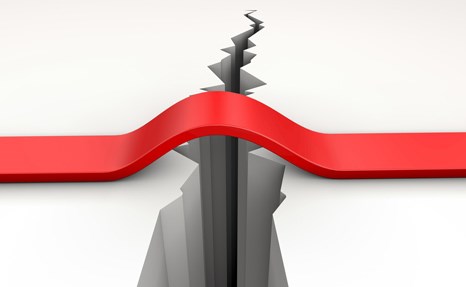
The Israeli Economy: Has the Melting Pot Succeeded?
Written By: Momi Dahan
A study conducted by IDI Senior Fellow Prof. Momi Dahan that reveals that there has been a continuous narrowing of income gaps between Israelis of European-American origins and of Asian-African origins since the 1990s.
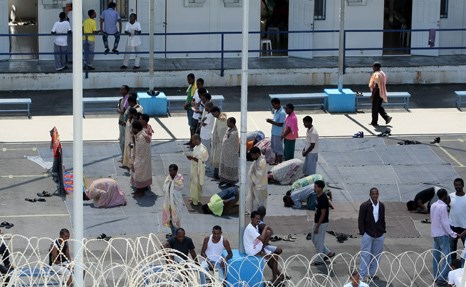
Quashing Legislation Mandating Lengthy Detention of Asylum-Seekers
Written By: Prof. Reuven (Ruvi) Ziegler
Dr. Reuven (Ruvi) Ziegler shares observations on the decision of the Israeli Supreme Court that an amendment of the Prevention of Infiltration Law that mandated lengthy detention of asylum seekers is unconstitutional.

The Comeback of Polarization
Written By: Prof. Benjamin Brown
IDI researcher Dr. Benjamin Brown discusses the sense of attack experienced by the Haredi community in the 2013 election campaign and calls for a process of gradual change in integrating the ultra-Orthodox in the Israeli army and workforce.
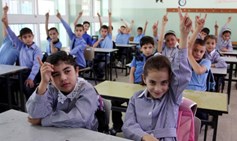
Analysis of Scholastic Achievement Disparities between the Arab and Jewish Sectors: The PISA Tests, 2000 to 2009
Written By: Leah Borovoi, Avital Manor, Nabil Khattab
Research conducted by IDI's Arab-Jewish Relations project reveals a disparity between student achievement in the Jewish and Arab sectors. This abstract points to the variables that explain these disparities.

A New Social-Economic Agenda for Israel
Written By: Momi Dahan
In an op-ed, originally published on the Ynet website, IDI Senior Fellow Dr. Momi Dahan reflects on the wave of social protest of the summer of 2011 and stresses that the response to the protest must be a new social-economic agenda.

Before the Next Shock Hits
Written By: Avi Ben-Bassat
In this article, originally published in Haaretz on April 1, 2010, IDI Senior Researcher Prof. Avraham Ben-Bassat warns that Israel's policy of reducing taxes should be frozen since it may precipitate an economic crisis, and advocates giving preference to increasing public spending while preserving the economy's stability.

Gamblers in Disguise
Written By: Prof. Yedidia Z. Stern
Prof. Yedidia Z. Stern examines the reality of the ongoing financial crisis, and tries to explain how such a rational industry gets carried away with reckless decision-making procedures.

Women and Civil Society in Israel
Written By: Naomi Himeyn Raisch
In an article originally published in Hebrew in IDI's online journal Parliament, Naomi Himeyn Raisch surveys the unique characteristics of women's organizations and how they affect productivity in Israel.

Value in Doing Business with Israel
Written By: Barak Cohen
Despite last summer's war in Lebanon, Hamas's rise to leadership, Hizbullah rockets being aimed at Israeli cities, and international boycotts, Israeli economy is thriving, the national debt and unemployment have significantly dropped, and investors continue to look to Israel as fertile ground for investment.

How to Fight Poverty in Israel Without Costing Israelis a Shekel
Written By: Momi Dahan
In an article originally published in the Forward, Prof. Momi Dahan argues that it is possible to fight and reduce poverty without increasing taxes.

COVID-19: Initial Survey Findings on Self-Employed Workers in Israel
Written By: Daphna Aviram-Nitzan, Yarden Kedar
As of the beginning of December 2020, 75% self-employed workers were working, though 45% were working only part-time. Only 29% were working the same number of hours as before the crisis.
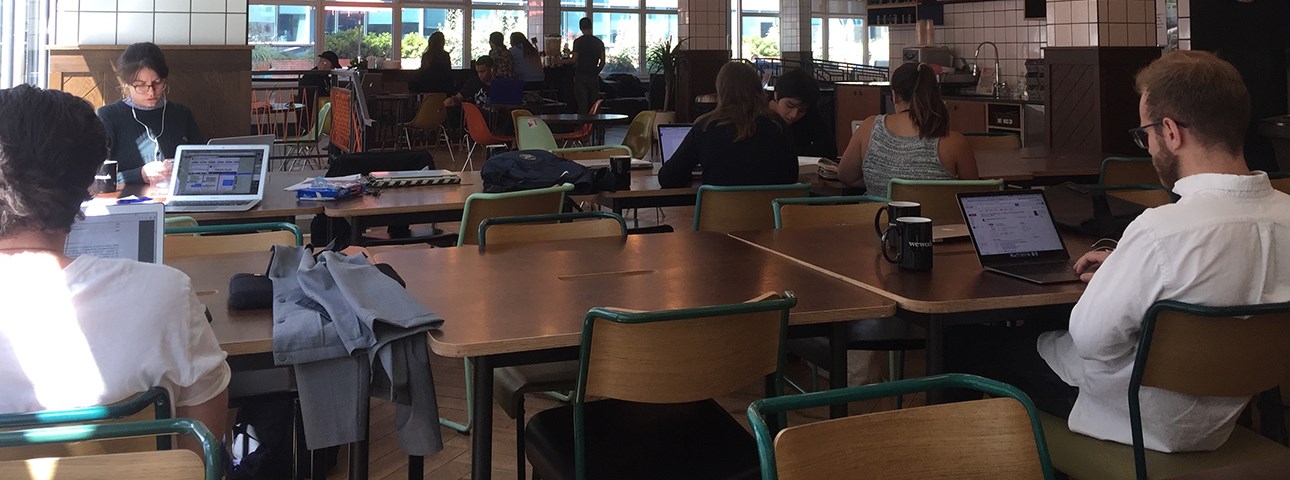
How Hard Is It to Do Business in Israel?
Written By: Daphna Aviram-Nitzan, Prof. Yuval Feldman
"In order to change this trend, we must increase the use of technological tools and behavioral economics."
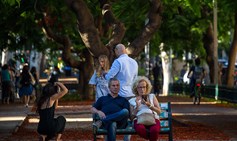
Peace Index: 40% of Israelis Believe that Rifts Between Groups Will Widen
Monthly survey also finds that 84.5% of Israeli public defines mood as good or very good while 43% expresses trust in Prime Minister Netanyahu.

The Employment Revolution and the Haredim Who Are Being Left Behind
Written By: Dr. Asaf Malchi
With 50% of young Haredi men expected to enter the labor market actually those with poorer skills and abilities, there is an urgent need for an in-depth rethinking about Haredi education.
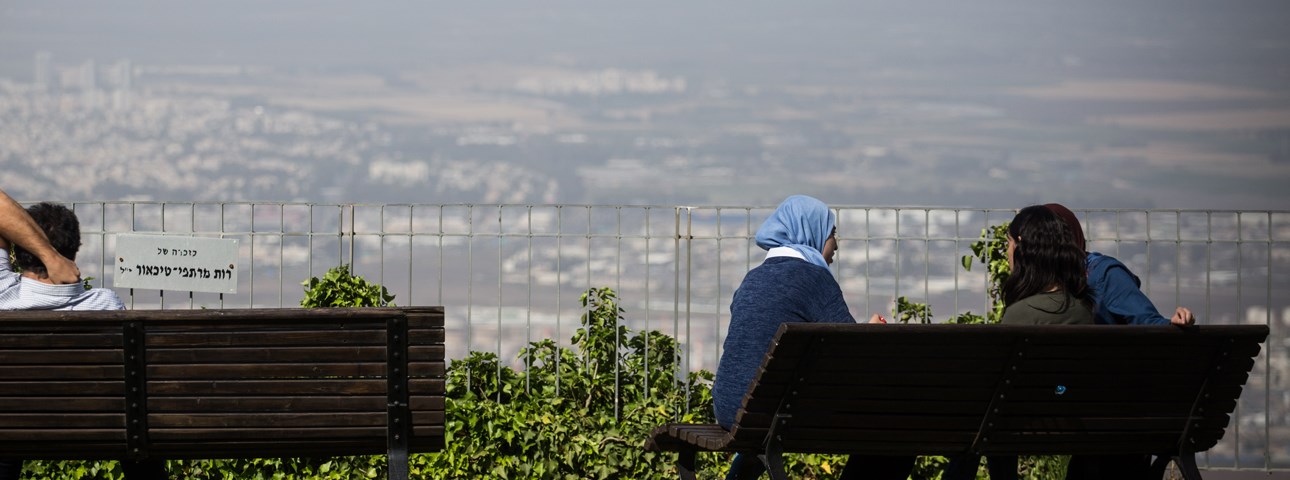
Time to Include Arabs among the Decision-Makers
Written By: Dr. Nasreen Haddad Haj-Yahya
The state and its Arab leadership, not only the political leadership, must work together to bring as many Arab citizens as possible into the decision-making echelons.

Active Labor Market Policy Must Become Priority
Written By: Prof. Yotam Margalit
For Israel's economy to grow, significant investment in building a strong and effective infrastructure for occupational training and reemployment is critical.
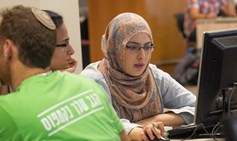
Opportunities Now: Arab Employment in the Galilee
Written By: Dr. Nasreen Haddad Haj-Yahya
The north presents real opportunities for Israel’s society and economy. Turns out that the solutions have been in plain sight all along.
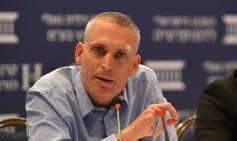
Deputy A-G Licht: ‘Reduction of Regulation Should Not Harm the Public or the Government'
Ministry of Finance’s Hizkiyahu: ‘Israel has an anti-business environment’
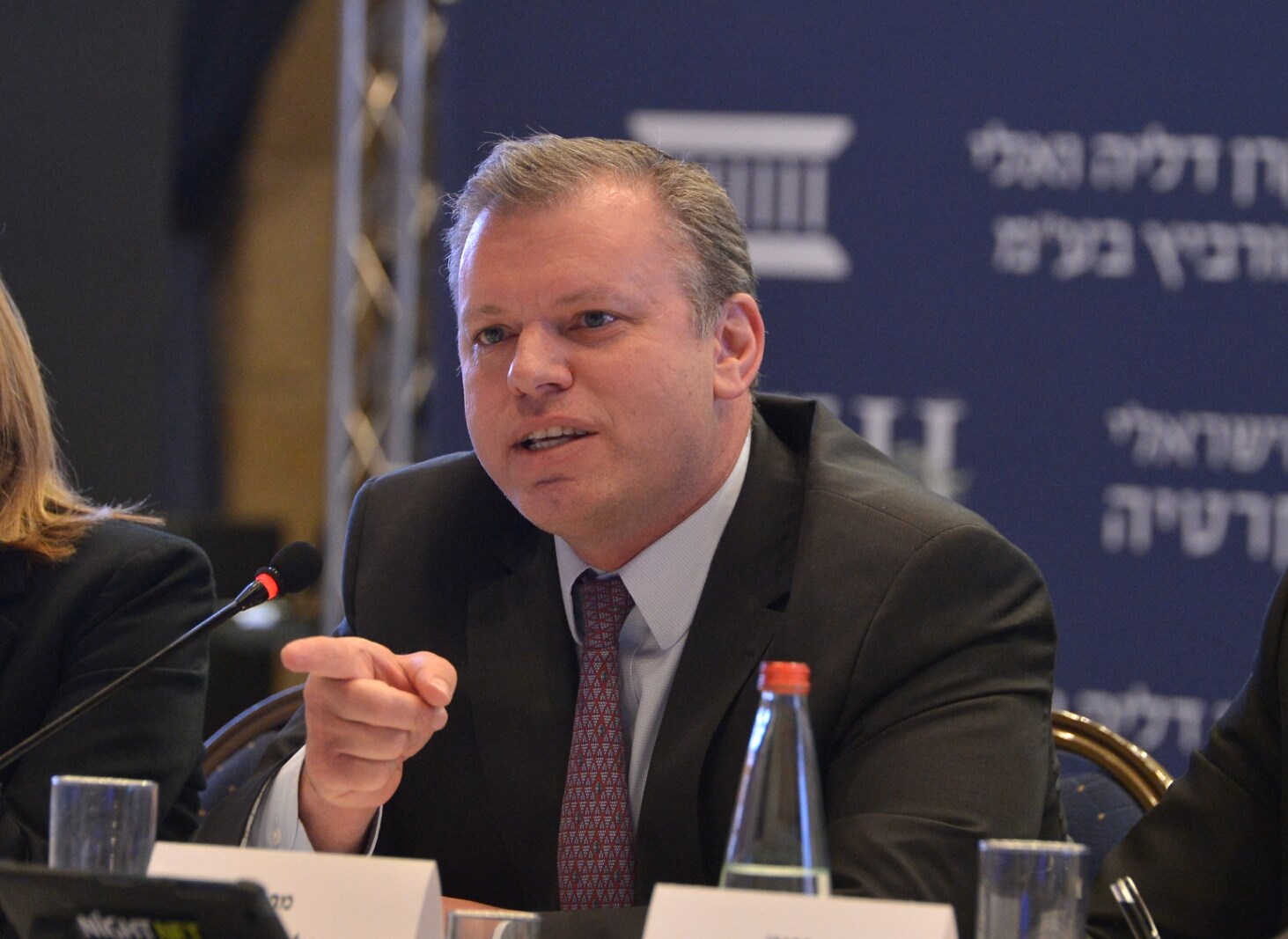
Eli Groner, Director-General, PMO: ‘When There is Excess Regulation, 99% of the Public Suffers and 1% Earns’
Day 2 of the Eli Hurvitz Conference on Economy and Society highlights challenges and solutions for Israel’s excess regulation and bureaucracy
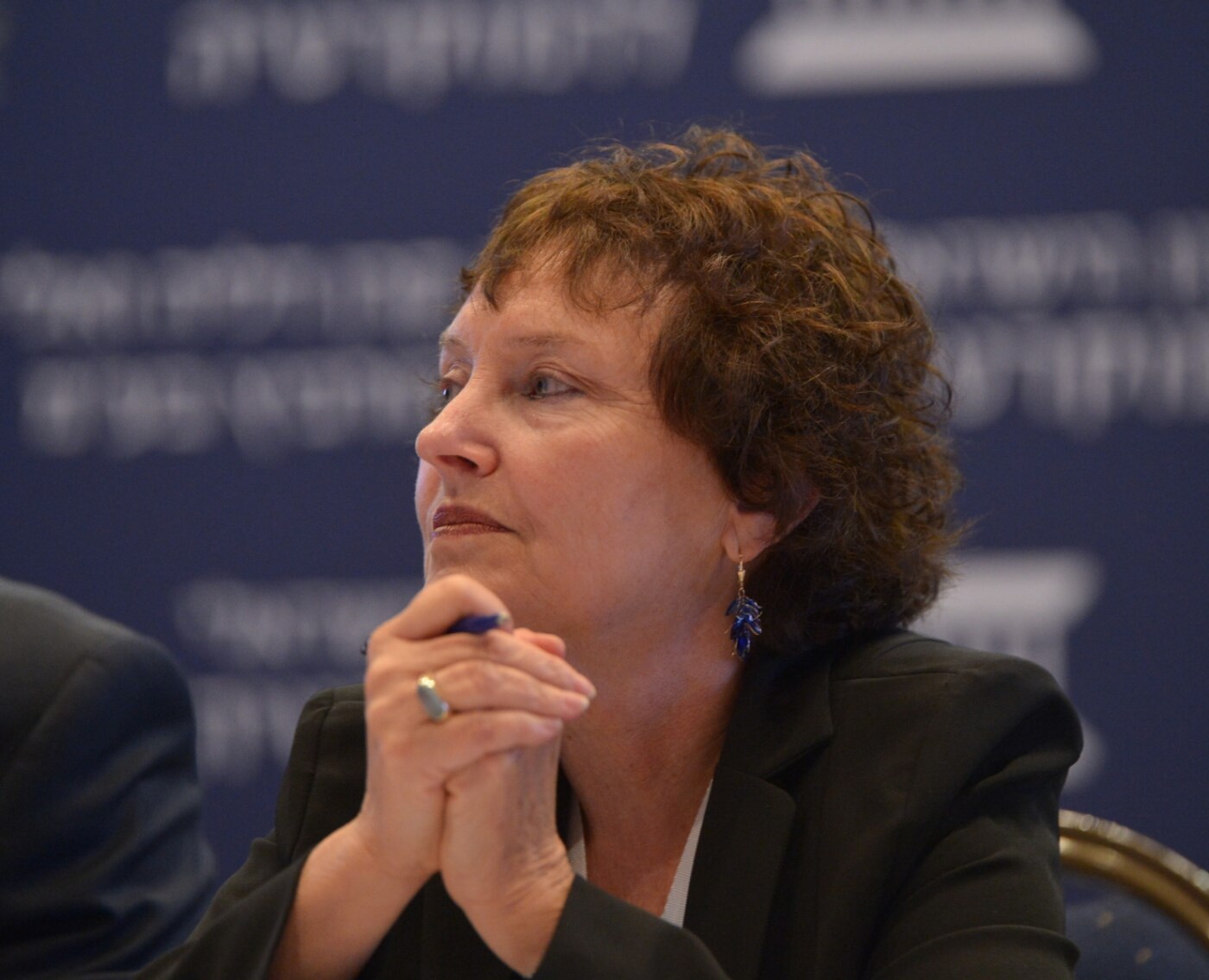
BOI Governor Flug Says Israeli Economy is ‘Not Renewing Enough’
‘In skills and problem solving, we are at the bottom [of international indices] and it is quite embarrassing for a country that is referred to as the Startup Nation,’ Flug said
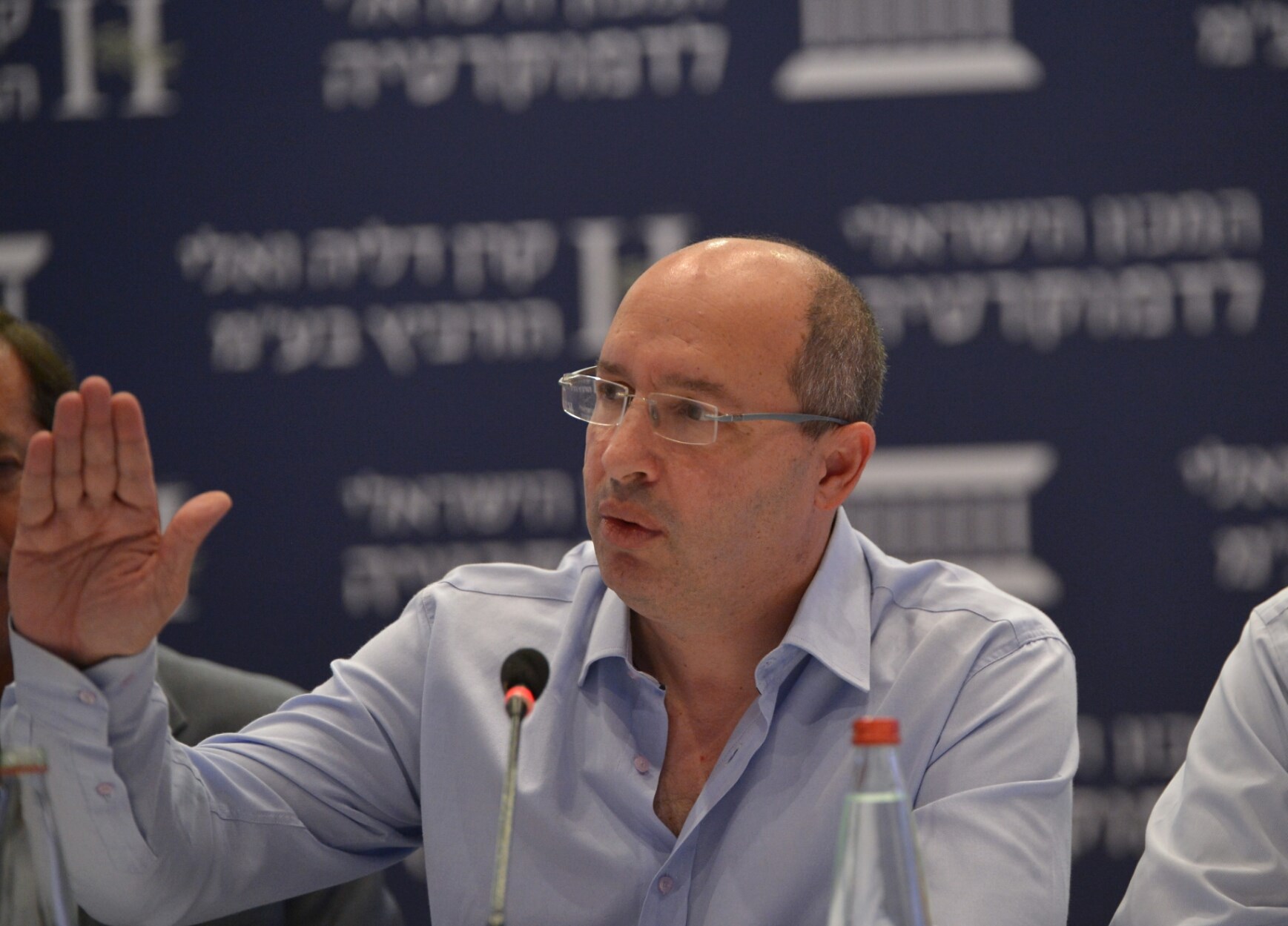
Avi Nissenkorn, Histadrut Labor Union Chair: Government has Failed to Fix Inconceivable Socioeconomic Gaps
Avi Simhon, PMO’s Office: Those without special skills will find themselves competing with China, the Philippines and Thailand
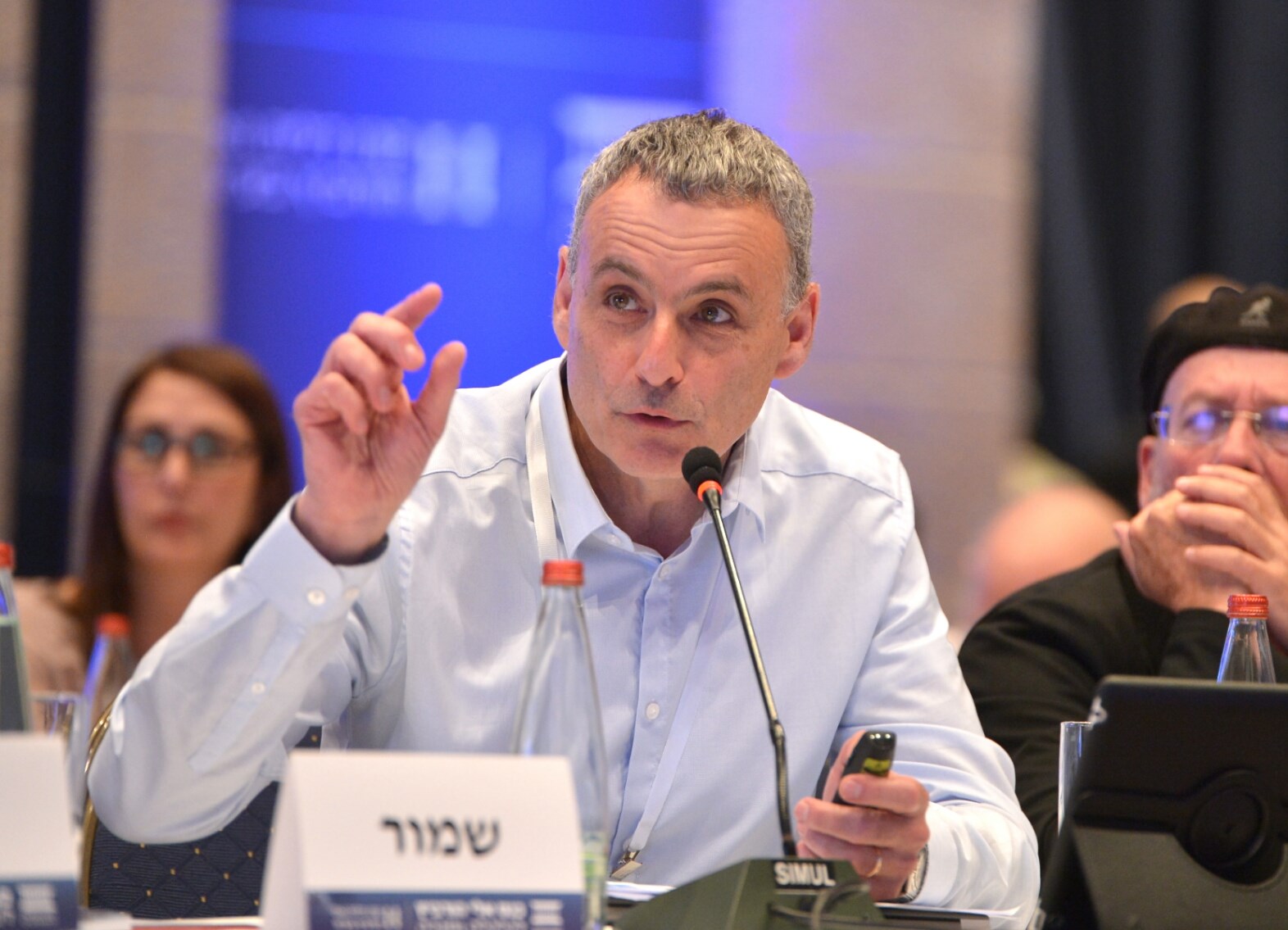
Prof. Nathan Sussman: Israel is in a vicious, downward economic cycle
Reem Younis of Alpha Omega: Arab engineers are being trained in Israel but leaving the country
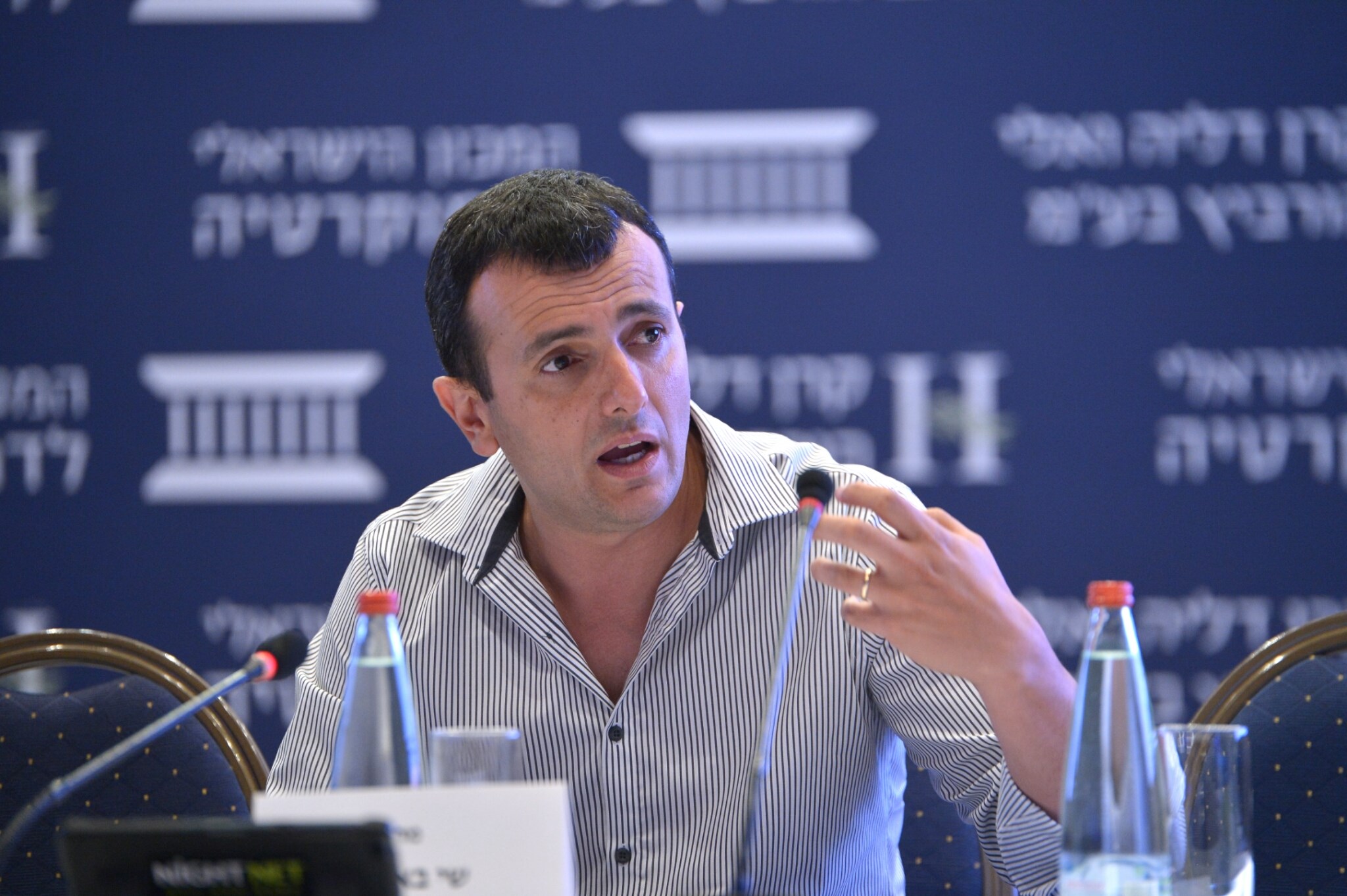
Ministry of Finance’s Babad: Stop Forcing Ultra-Orthodox to Study Core Curriculum, Consider Alternative Technology Track
Minister Bennett, Startup Nation Central's Kandel and Leumi Group’s Russak-Aminoach headline 2017 Eli Hurvitz Conference on Economy and Society

Eli Hurvitz Conference on Economy and Society
With the featured participation of: Bank of Israel Governor, Education Minister, Economy Minister, Director-General of the Finance Ministry, Director-General of the Prime Minister Office, Chairman of the Histadrut Labor Federation, Director-General of Bank Leumi, Director General of Microsoft Israel and other VIPs
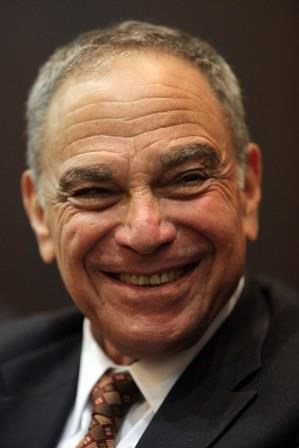
Professor Eytan Sheshinski joins the Israel Democracy Institute (IDI) as a Senior Researcher in the Center for Governance and the Economy
Top Israeli economist, Professor Eytan Sheshinski, has joined IDI as a senior researcher in the Center for Governance and the Economy, under the leadership of Dafna Aviram-Nitzan.

